






In the fall of 2014, Groton’s tuition was highest among forty independent school peers and climbing at an unsustainable rate. By adopting GRAIN, the GRoton Affordability and INclusion initiative, Headmaster Temba Maqubela and the Board of Trustees reversed that trend. page 22
2 Message from the Headmaster
3 Circiter / Around the Circle
16 Personae / Profiles
33 Voces / Chapel Talks
43 De Libris / New Releases
44 Grotoniana / Athletics
58 Grotoniana / Arts
63 In Memoriam
65 Form Notes Adam Richins Cover illustration by Sage Stossel
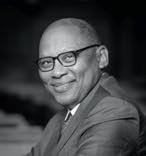
THIS FALL , we mark ten years of the Groton Affordability and Inclusion initiative, better known as GRAIN. What started as a two-part commitment to ensure that admissions decisions were always need blind and to keep Groton’s tuition under control has blossomed into a mindset that has impacted many areas of the school.
This mindset has brought us through a decade of support that can only be described as incredible, with more than $90 million donated in support of GRAIN’s tuition containment and affordability efforts, out of an overall $200 million raised in capital, endowment, and Groton Fund annual donations. It also marks nothing less than a paradigm shift in how tuition increases are implemented.
How did this amazing journey begin? “My spouse and I would like to partner with you and Vuyelwa on this GRAIN journey,” is how the first donor started, back in the fall of 2014. “We have never made a gift this large. We will give $5 million.”
Up until this point, there was still some nervousness and uncertainty over whether our initial $50 million goal could be met. (Mind you, we were still raising the remaining third of the funds for the Schoolhouse.) Thanks to this gift, that nervousness diminished and, on November 10, 2014, the Board of Trustees announced that tuition would be frozen for three years. From that moment on, the talented missing middle would be no longer missing at Groton.
The difference GRAIN has made since cannot be overstated. Bottom line: Every student in the school is on some form of significant financial aid. Had we not embarked
on the GRAIN train when Groton charged the highest tuition among forty peer schools, our tuition would now be approximately $90,000 and, within a few years, we would’ve been the first school to hit the dubious milestone of $100,000 per year.
Instead, thanks to GRAIN, Groton is the undisputed leader among peers on affordability. When I was in Seoul over March break, a Groton alumna summed it up best when she said, “At Groton, I received a Lamborghini education for the price of a Lamborghini. Today’s students are receiving a Lamborghini education at the price of a Volkswagen.”
Donors committed to a lofty goal of making Groton the most affordable of all independent schools. That gave us the freedom to lean into cost containment and further strengthen GRAIN’s foundation. As of 2022, Groton has become a leader in affordability among its peer group of forty independent schools, and with the GRAIN mindset firmly in place, the goal is to maintain this position. At more than $90 million and counting, we are inching ever so close to the $100 million goal and cementing GRAIN as part of Groton’s DNA Cui servire est regnare!

Temba Maqubela Headmaster
Editor
Sean Kerrigan
Design Irene HL Chu
Senior Editorial Advisors
Kathleen M. Machan
Christopher Temerson
Form Notes Editor
Jessica M. Hart
Editorial Assistant
Alexander Greene
Advisory Committee
Amily E. Dunlap
Kimberly A. Gerighty
Giulia King
Allison S. MacBride
John D. MacEachern P’10, ‘14, ’16
Paul Ryan
Editorial Offices The Schoolhouse Groton School Groton, MA 01450 978 - 448 -7506 quarterly@groton.org
Send feedback, ideas, or letters to the editor to quarterly @groton.org.
Other School Offices
Alumni Office: 978 - 448 -7520
Admission Office: 978 - 448 -7510
Groton School publishes the Groton School Quarterly three times a year, in the fall, winter, and spring/summer, and the Annual Report once a year.

An anonymous alumnus will give $15 million to Groton School in support of the school’s long-term financial stability. The gift half of which ($7.5 million) was received this past spring, with the remainder coming in over the next few years will go directly toward paying down a portion of the school’s outstanding debt. It is believed to be the largest gift in school history.
“We are grateful for this transformational gift to Groton School from a graduate who cares so deeply about our school and is so supportive of where Groton is today and its vision moving forward,” said Board of Trustees President Benjamin Pyne ’77, P’12, ’15. “This gift, along with the work the trustees have done on developing a formal policy around debt, will build on Groton’s strong foundation so that it can continue to implement its mission ever more forcefully for generations to come.”
“We often talk about the ‘Groton Embrace,’” said Groton Headmaster Temba Maqubela. “When a donor who is as unassuming as this alum makes a gift as significant as this without needing any accolades or fuss, it is an epitome of the Groton embrace. It is rare for anyone to make an impact of this magnitude and insist on anonymity. This example of giving for the greater good is a lesson that is not lost to the Groton community. It is goodness, generosity, and humility intertwined.”
This $15 million gift found inspiration in two groundbreaking policies implemented by Groton School in recent years: the GRAIN (GRoton Affordability and INclusion) tuition- and cost-containment initiative, and a formal debt management policy approved by Groton’s trustees this past year.
CORRECTION : In the Fall/Winter 2023 Form Notes, Hadley C. Callaway ’17’s name was misspelled and her gender misstated. We regret the error.

“My hope is that this gift will validate for Vuyelwa and Temba Maqubela and the trustees their foresight in adopting the new debt policy and encourage them to continue their commitment to responsible financial management through orderly oversight of potential future and existing debt,” said the donor. “This effort, in unison with continuing the school’s policy of maintaining its tuition at the most affordable possible level through GRAIN, will no doubt keep Groton School at the top of its field.”
Groton’s debt policy, the first of its kind at the school or any of its peer institutions, was adopted by the Board of Trustees at its November 2023 meeting and ensures that any future debt has an explicit plan to repay.
“The visionary and authentic leadership of Vuyelwa and Temba reminds us that inclusion demands to be considered in all of our choices at Groton and most especially when it comes to the strategic vision of the school,” said Trustee Ann Fox ’94. “Affordability is a critical objective if we are to ensure that Groton continues to be a place that welcomes all. Temba constantly
says, ‘Who is not at the table with us?’ This simple question led us to realize we were missing the ‘middle’ at Groton. That’s why this gift is so important and so humbling. This alum feels that strong governance leads to solid financial footing for Groton, allowing us to continue to be one of the most affordable and inclusive of our peer schools.”
Historically, Groton School has taken on reasonable debt with low-interest rates to finance building projects and capital improvements, a standard practice among independent schools. This gift will pay off a significant portion of Groton’s outstanding debt, including bonds issued to cover part of the Schoolhouse renovation project.
“It goes without saying that this donor cares deeply for Groton,” said John MacEachern P’10, ’14, ’16, director of development and alumni affairs. “He had been a form volunteer for nearly five decades, encouraging his formmates to give back to the school. This gift is the finest expression of the donor's desire to be, in his own words, ‘useful’ to Groton. Every school should be so fortunate as to have a graduate so humble and helpful in its ranks.”

An anonymous alumni donor has given Groton School an exedra as a token of appreciation for what the school has meant to his life.
An exedra is a large semi-circular bench with a straight back, taken from Greek architecture the name translates into “platform” or “exterior seat” and originally used as a place of worship. In a letter to Board of Trustees President Benjamin Pyne ’77, P’12, ’15 and Headmaster Temba Maqubela, the donor explained that the idea for the gift came as he was sitting on the Willard exedra which is tucked in behind the Headmaster’s House garage near the flagpole on a summer day a few years ago.
“I am deeply grateful to the school for
the superb education it gave me, in terms of both the knowledge it conferred and the spirit of inquiry it instilled,” he wrote.
“Groton without question has been the most formative component of my life. (That is something I would not have predicted in the fall of First Form Year when I retreated to the basement of the Chapel every morning before the service to weep with homesickness.) And I have wanted to give it something substantial in return.”
The exedra sits between the tennis courts and lacrosse fields, in a spot the donor hopes will become “a forum for small comradely gatherings as well as for solitary reflection.”
“To me the exedra symbolizes the school in microcosm: something comparatively small,
Sarah Ku ’26 finished second in the Albert Schweitzer Organ Festival Hartford, one of the top competitions for young organists in North America, held September 23, 2023, at Trinity College, Hartford.
The mission of the Albert Schweitzer Organ Festival Hartford is to support and encourage young organists in the earliest stages of their education and careers, and to increase appreciation of organ music in the general public. At the heart of the festival is an annual, national competition for young organists that alternates biennially between high school and young professional (up to age 23) divisions. Competitors earn significant cash prizes to support their education and career endeavors. The festival also regularly presents workshops, lectures, and major performances, frequently in collaboration with the Hartford Symphony Orchestra.
Sarah was one of just three high school students to compete in the final.
Sarah’s journey into the world of organ music began at the age of 12, when her music instructor at elementary school introduced her to the instrument during her
role as a piano accompanist. After being awarded the Britton Organ Scholarship, she moved to Bristol, UK, to study organ at Clifton College under the tutelage of James Drinkwater. Sarah acquired a strong foundation in the fundamentals, achieving distinction in both organ and piano through the Associated Board of the Royal Schools of Music. Notably, she also secured second place in the 2020 St. Edmundsbury Cathedral Virtual Organ Competition.
As a student member of the Bristol and District Organists' Association (BDOA), Sarah actively participated in various performances, including a virtual recital, and was honored with financial awards from the Edgar Joyce Fund of the BDOA.
Since arriving on the Circle, Sarah has seamlessly integrated herself into the Groton musical community. She studies organ with Daniel Moriarty and frequently accompanies and contributes her voice to the choir, while also playing a significant role in the activities of the Groton Chamber ensembles as a pianist.
“Sarah loves to make music, whether
fostering collegial intimacy, and bearing hallmarks of two subjects that I loved, namely Latin and mathematics,” he wrote.
As a result, the exedra is inscribed with the phrase arbores gloriae grotoniae sunt, Latin for “trees are the glory of Groton,” and the mathematical formula for the volume of a sphere. In addition, three Ginkgo biloba trees were placed along the approach to the exedra, reflecting the donor’s longstanding interest in botany, and harmonizing with the Latin inscription.
“They should be a spectacle of color in the fall, evoking saffron-cloaked Hymenaeus from Ovid's Metamorphoses,” the donor wrote, “as taught to us by Mr. [Hugh] Sackett in Third Form Latin.”
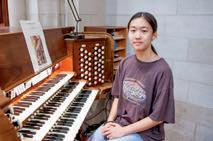
this is in ensemble with other student musicians, or accompanying the choir, or in organ competitions,” said Mr. Moriarty. “I think it's inspiring that Sarah puts herself in situations that result in her further growth as a musician and performer.”
Sarah won second place in the 2023 North Carolina Salem College high school competition within the advanced division. She attended the Curtis Summer Organ Intensive Program in summer 2023. Beyond her musical interests, she enjoys computer programming, solving logic puzzles and escape rooms, running cross country, and playing tennis.
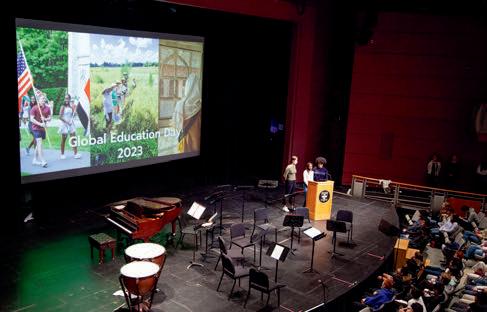
Groton celebrated Global Education Day on November 2, 2023, with an assembly in the Campbell Performing Arts Center (CPAC), where faculty members introduced upcoming Global Education Opportunities (GEOs) to France, Scotland, Italy, and Peru, as well as an orchestra GEO to five European countries.
French teacher Rebecca Stanton spoke about the France GEO, where students will spend twelve days exploring the cities of Paris and Angers. Starting in Paris, students will visit some of the most esteemed sights, such as the Eiffel Tower. Following their stop in Paris, students will stay with host families in Angers, where they will attend classes in the mornings and explore historical sites in the afternoons. Madame Stanton will co-lead this GEO with French teacher Franck Koffi.
Next, Theater and Dance Department Head Laurie Sales introduced the GEO to Scotland. Students will be immersed in arts and culture in Edinburgh as they take part in the annual American High School Theatre Festival. This festival is a part of the world’s largest performing arts festival, the Edinburgh Festival Fringe. During this GEO, students will perform an original theater piece for an international audience. The University of Edinburgh will provide lodging, where students will meet other students from across the country and Canada. Other experiences include a chance to see the Royal Edinburgh Military Tattoo and a visit to St. Andrews. Ms. Sales will lead this GEO with Director of Community Engagement Lizzie Phan and Technical Director Brandt Belknap.
Italy is another opportunity hosted by Assistant Director of Globalism & Experiential Learning Mary Frances Bannard. This GEO serves as an immersive experience in the classics, including
visiting the ancient sites in Rome, including the Colosseum, Forum, Campus Martius, and St. Peter’s Basilica, all while reading and speaking in Latin. Also, students will travel to other parts of Italy, including the Bay of Naples, to visit the sites of Pompeii and Herculaneum. As they wrap up their experiences, they will get the chance to see the Domus Aurea and walk along the Appian Way. Ms. Bannard will co-host this GEO with classics teacher Preston Bannard.
Returning is the Peru GEO hosted by Spanish teachers, Fanny Vera de Viacava and Luis Viacava. This excursion takes place in the Sacred Valley of Peru, where students will be hosted by families in the town of Ollantaytambo, which is known as being the last living Incan town. This experience focuses on building one’s Spanish skills through immersion within the local communities. Some activities include visiting Machu Picchu, ceramic making, and chocolate making.
To conclude, the audience was treated to a performance by student musicians who played a sampling of the music that would be offered on the Europe GEO. This GEO, hosted by the Director of Instrumental Music Mary Ann Lanier, will take students from the Chamber Orchestra and Select Chamber Ensembles to Austria, Czech Republic, Germany, Italy, and Slovenia. Here, students will be immersed in the world of music through performances, cultural exchanges, and masterclasses. Along with Ms. Lanier, Chamber Orchestra Conductor Timothy Terranella will be co-hosting this experience.
Groton's GEOs are accessible to all students, and generous financial aid is provided.
Alexander Greene
This past fall, Groton School welcomed Jay Herlihy as its new chief financial officer (CFO).
Mr. Herlihy who most recently served as associate dean of finance for the Faculty of Arts and Sciences at Harvard University brings a proven track record of providing sound, creative support and advice, and an understanding of the importance of institutional stewardship that balances financial responsibility with academic and intellectual needs.
At Harvard, Mr. Herlihy partnered with deans, faculty, staff, and central administration to expand programs, balance budgets, reorganize offerings, and plan major capital investments. Prior to working at Harvard’s Faculty of Arts and Sciences, he was director of financial planning and administration and then associate dean for finance at the Harvard Graduate School of Education and at Tufts University’s Fletcher School of Law and Diplomacy. A certified public accountant, Mr. Herlihy also worked at Deloitte and Touche as a senior accountant before entering higher education.
“I’m excited to be part of a learning community that’s as dedicated to providing excellence and accessibility in education as Groton School is,” Mr. Herlihy said. “To be able to join a school with such a long history
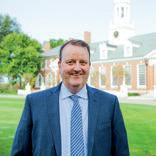
of devotion to its students’ intellectual and personal growth is very gratifying.”
In his new role, Mr. Herlihy plays a key part in continuing Groton’s groundbreaking GRAIN (GRoton Affordability and INclusion) initiative, which froze tuition for three years at its inception in 2014 and again this academic year and ensures that applicants are chosen without regard to their ability to pay. Under GRAIN, Groton went from highest tuition in its peer group to lowest in just eight years.
“Jay Herlihy brings a wealth of experience and expertise in accounting, auditing, finance, and facilities management, and will ensure that proper guardrails are in place to support the school’s Strategic Framework,” said Groton Headmaster Temba Maqubela. “I know that, with Jay’s help, we will continue to lead in the areas that have
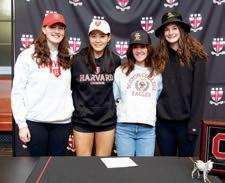
always been cornerstones of what makes Groton a great institution: affordability, academic programming, compensation, and management of the physical plant.”
Mr. Herlihy replaces current CFO Julie Dolan, who retired at the end of December. Among her many accomplishments, Ms. Dolan helped make GRAIN and Groton’s larger cost containment initiatives sustainable.
“We are fortunate that Jay is taking the baton as the next in a continuum of amazing Groton CFOs,” Mr. Maqubela added, “and trust he will continue the extraordinary success and accomplishment of Julie Dolan. We wish Julie the best in her retirement.”
Members of the search committee praised Mr. Herlihy’s balance of experience in finance and education, and his shared passion for the things that make Groton’s mission so special.
“Jay’s extensive experience in finance and education and his deep interest in Groton and its mission shone through all the discussions we had with him,” said Benjamin Pyne ’77, P’12, ’15, president of Groton’s Board of Trustees and a member of the search committee. “We are so excited that he will be joining the Circle later this fall and look forward to working with him in the years ahead.”
Mr. Herlihy, who officially joined Groton on November 1, holds an MBA and master of accounting degree from Northeastern University and a bachelor’s degree in economics from Tufts University.
Sixth Form student-athletes Giulia Colarusso, Morgan Fillion, Alicia Guo, and Keira Ley announced their athletic commitments to NCAA Division I and Division II colleges on November 8, National Letter of Intent Signing Day.
Two of Groton’s student-athletes will compete for Harvard this coming year: Alicia in volleyball and Keira in ice hockey. Giulia will continue her lacrosse career at Boston College. Morgan will be playing soccer for Division II Ferris State University in Big Rapids, MI.
“Groton is proud of our NCAA Division I and Division II studentathletes, as their signatures on these letters of intent symbolize so many traits representative of all Groton students: persistence, grit, hard work, leadership, integrity, dedication, and humility,” said Athletic Director Bob Low. “The entire Groton community is proud of these standouts and of all the student-athletes who wear the Groton School jersey.”
Groton looks forward to cheering on all the Zebras when they take their considerable talents to college.
The Circle was bustling with families and covered in fall foliage this past October 26 to 29, as Groton School hosted its annual Parents Weekend.
Students enjoyed reconnections with their parents (and oftentimes grandparents, siblings, and other relatives), and parents got to explore the Groton campus and all it has to offer, including academics, the arts, athletics, and fun.
Visiting parents had the opportunity to connect with Groton faculty and staff throughout the weekend, as nearly 2,300 meetings were held with teachers and advisors.
There were open houses at the newly renovated Counseling and Wellness Center and with the Spiritual Life team, and College Counseling sessions for parents and students from several forms.
Friday wrapped up with a pregame tailgate before the boys soccer team took on Tabor at the Field of Inclusion, winning 2–1 on a late-game goal.
Following a Parent Fund meeting on
Saturday, Headmaster Temba Maqubela gave his customary address in the Schoolhouse’s Sackett Forum, centering his remarks around love, gratitude, and purpose.
“Even though this is my fortieth year of teaching,” he said, “I continue to be in awe of my colleagues in the classroom, as coaches, advisors, and dorm parents.
“I trust that this weekend,” Mr. Maqubela continued, “all of you have had a glimpse of what goes on when you are not here because the teachers know each child so well. As I often remind the parents, we may not know you well. However, as their teachers, coaches, and advisors we will know your child well. I hope the glimpse you have had this weekend proves this and shows the growth and trajectory toward a positive continuum.”
Mr. Maqubela explained the importance of practicing intentionality daily, even if it’s something as simple as leaving a cell phone at home during the school day.
“I have nothing against Apple stock,” he said, “just cell-phone use in class, at chapel,


or generally in place of honing skills in being a conversationalist or staying connected with those around us.”
Saturday continued with an overview of Groton’s Global Education Opportunities (GEOs) and more sporting events before a reception at Sunset Farm and a performance spotlighting Groton’s young musicians at the Campbell Performing Arts Center (CPAC).
Sunday saw the weekend begin to wind down, with brunch and spiritual services in the morning and a student production of The Curious Incident of the Dog in the NightTime in the CPAC’s McBaine Studio Theater in the afternoon.
More than 350 parents took part in the event, including guests from Austria, Botswana, Canada, China, Czechoslovakia, France, Hong Kong, Korea, Mexico, Netherlands, Norway, Poland, Saudi Arabia, Singapore, South Africa, Spain, Switzerland, Thailand, the United Arab Emirates, and the United Kingdom.



Groton School welcomed its 2023–24 Pyne Chapel Speaker, Kwok Pui Lan, PhD, to the Circle this past October for two days of discussion, debate, and exploration of the role of religion in world affairs.
The Percy and Eben Pyne Chapel Speakers Fund was established in 1999 to bring individuals to the Groton campus who are role models for thinking and acting ethically in the world at large. Dr. Kwok is dean’s professor of systematic theology at Candler Theological Seminary at Emory University in Atlanta, where she focuses on Asian feminist Christian theology and postcolonial theology.
Dr. Kwok is best known for her scholarship that has pioneered a path for theologians and scholars of religion, especially within postcolonial feminist and Asian feminist theologies. She teaches contemporary spirituality and interfaith understanding and has written or edited twenty-three books in English and Chinese. An Anglican Christian, Dr. Kwok places oppressed people and marginalized perspectives at the center of her work.
She discussed these themes during a Monday-morning chapel talk that spanned key moments in her career, beginning when
she chose to focus on religion and philosophy in college.
“I wasn’t interested in money or science,” Dr. Kwok said. “I was looking for solutions and answers to profound questions.”

As her studies and career progressed, Dr. Kwok started exploring how religion played a part in politics and global issues. After the 1997 handover of her native Hong Kong from the United Kingdom to the People’s Republic of China, Dr. Kwok began to look at empires throughout history, and the legacy of religion-fueled war and conflict. And, upon moving to Boston, she began to notice the effects of climate change, not just on humanity, but all of Earth’s creatures.
Such challenges, she said, call for a new breed of culturally sensitive leaders who work together across nationalities and religions to care for the world’s underprivileged: “Today, we live in a challenging time. We need to be mindful of so many people living in unstable and non-sustainable conditions.”
Throughout the day Monday, Dr. Kwok met with classes from the World Languages, History, Religious Studies, and English
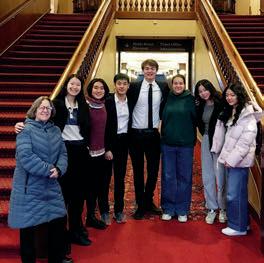
departments for informal question-and-answer sessions in the Sackett Forum. In between sessions, she had lunch with faculty and students from the East Asian and South Asian student alliances.
Dr. Kwok said the students she spoke to showed a mature understanding of the world that gave her hope for the future.
“This visit gives me a lot of hope, because these students have been exposed to different religious traditions at such a formative age,” she said. “I did not have the opportunity to study other religions when I was in high school but they have. That they can ask those intelligent questions means that they’re thinking about what’s going on in the world and that they are also looking for solutions and answers.
“By talking to people with perspectives different than their own, they’ll discover different ways of interpreting current affairs and, hopefully, become global leaders.”
Seven Groton School musicians and singers traveled to Mechanics Hall in Worcester, Massachusetts, in January for the sixty-seventh annual senior high school festival concert presented by the Central Massachusetts Music Educators Association (MMEA).
Each performer earned their spot through competitive auditions. After two six-hour rehearsals, four ensembles symphonic band, orchestra, jazz band, and chorus performed a varied, impressive concert program on January 13.
Brenda Li ’25 and Sade Pickering ’26 performed with the chorus, and Sade was chosen to be a featured singer in Rosephanye Powell’s “Sorida.” Amanda Chang ’26 performed with the concert band, and Brittany Deng ’24, Liv Ding ’26, Samuel Lu ’27, and Alexander Newman ’25 performed in the orchestra.
The packed house met each ensemble’s outstanding performance with enthusiastic applause and standing ovations.
Four of the musicians continued their MMEA journey at Boston’s Symphony Hall, having auditioned and won spots at the All-State Festival in March.
Brittany Deng, Liv Ding, Alexander Newman, and Sade Pickering all performed at the festival, with Liv seated as principal violist in the Massachusetts All-State Orchestra after earning the highest score among all violists.

On what would’ve been Martin Luther King Jr.’s ninety-fifth birthday, Groton School honored his life and legacy with a day of celebration, introspection, and community service.
Sunday snow squalls and morning temperatures in the low twenties were no match for the warmth in the Campbell Performing Arts Center (CPAC), as students, faculty, and staff gathered on a day off from classes to begin MLK Day together. Student singers Sage Greaves ’26 and Michelle Manza ’26 accompanied by Tiyanu Akinjaiyeju ’25 on drums and Asante Kiio ’25 on piano opened the assembly with a cover of the Bill Withers classic “Lean on Me” before Chaplain Allison Read gave an opening prayer.
Anna Malaika Tubbs PhD was the day’s keynote speaker, appearing on stage in an informal question-and-answer discussion with Associate Director of Admission and Director of Inclusion Outreach Carolyn Chica. Dr. Tubbs is the author of The Three Mothers: How the Mothers of Martin Luther King, Jr, Malcolm X, and James Baldwin Shaped a Nation, a New York Times’ bestseller published in February 2021 in which she examines the lives of these three extraordinary women and the impact they had on their sons and, in turn, history.
The free-flowing conversation covered Dr. Tubbs’ inspiration for writing the book, her background and creative process, and
how motherhood passed along a history of protest and fighting for justice from one generation to another. Throughout, Dr. Tubbs urged the student body to understand the methods behind oppression, so that they could be better prepared to mobilize for change when necessary.
“We need to be better aware of what’s going on,” she said, “so we can transfer our energy from shock and surprise to preparing and learning.”

And, while many like to point to strong, pioneering women like Alberta King, Louise Little, and Berdis Baldwin and Black women in general as the backbone of the Civil Rights movement and Black culture as a whole, Dr. Tubbs stressed that these and other women deserved more credit than just a supporting role.
“They’re not the women behind the men,” she said. “They’re the women before the men.”
In closing, she challenged the students to pay attention to when their voices are attacked or silenced because, it’s during those times that the power structure is most worried about them.
“Young people are the ones who are going to change our nation,” said Dr. Tubbs. “Keep doing what you all are doing, and pay attention to why your voices are under attack.”
The Essence step team closed out the keynote portion of the day’s event, after which Dr. Tubbs signed copies of her book in the CPAC lobby.
Following lunch, students gathered by form for workshops in the Multipurpose Room, while faculty met for their own workshop in Hundred House. Throughout the day, this year’s Mudge Fellow, New Haven–based artist Mitchell Rembert, held a drop-in workshop in the Dining Hall lobby where students, faculty, and staff could create their own art in his medium of choice, leather.
Also through the afternoon, members of Groton Community Engagement volunteered at the African Community Center of Lowell, providing logistical support for the center’s annual MLK celebration.
For more than 90 years, the traditional Lessons & Carols service has amplified anticipation of Groton’s holiday season and close of winter term. It was inspired by the original 1918 Nine Lessons & Carols service at King’s College in Cambridge, England, which sought to spark the holiday spirit and spread peace in the midst of war-stricken Europe.

St. John’s Chapel once again played host to Groton School’s most beloved Christmas tradition, the Festival of Nine Lessons & Carols, December 8, 10, and 14.
Groton School was founded in the tradition of the Episcopal Church, and the Festival of Nine Lessons & Carols has served as a distinct expression of that heritage since it was first offered on the Circle. In fact, Groton was likely among the first communities to emulate the service from King’s College, Cambridge, England, which held its first Festival of Nine Lessons & Carols on Christmas Eve in 1918, just as World War I ended and during the deadly influenza pandemic.
Today, the service is replicated and cherished by communities all around the world. The readings tell of God’s loving purposes for humankind, and the carols offer comfort and joy for all people. A founding trustee of Groton School and friend of Endicott Peabody, the Right Reverend Phillips Brooks wrote the text of the famous carol “O Little Town of Bethlehem,” which includes the line “the hopes and fears of all the years are met in
thee tonight.” This service holds us all, and the hopes and fears of our years, again this year.
The Reverend Allison Read, Groton School’s chaplain, presided at each service, which began after a prelude by the Groton School Chamber Orchestra, directed by Tim Terranella.
Groton’s choir, under the guidance of Choirmaster and Organist Daniel Moriarty, sang traditional hymns and carols, while honorees shared the nine religious readings — the lessons. Soloists included Amelia Barnum ’24, Ava Bridges ’24, Anders Caspersen ’25, Chloé Farel ’24, Afrika Gaye ’24, Alicia Leng ’28, Folasade Pickering ’26, Charles Rogers ’24, and Kayla Zheng ’26.
The December 8 audience was made up primarily of our neighbors in Groton and other surrounding towns, and those relationships were represented in the guest speakers, who included Groton Public Library Director Vanessa Abraham, African Community Center of Lowell Founder and Director Gordon Halm, the Reverend Stephanie Bradbury, priest in charge at St. Andrew’s Episcopal Church in
Ayer, and the Rev. Seán Maher, pastor of the St. J’s Collaborative of Our Lady of Grace and Saint John the Evangelist Roman Catholic parishes in Groton, Pepperell, Dunstable, Townsend, and Ashby.
The December 10 service welcomed parents and alumni. Speakers included Charles C. and Ann W. Alexander Chair and Director of Academic Skills Kate Dennison P’12, ’12, ’15; Stella Nganga P’25; Morgan E. Pagliocco ’14; Trustee William C. Vrattos ’87, P’18, ’19, ’23; former organist and choir director Craig E. Smith P’85, ’88, ’89; Chapel Prefect Isabella Gardiner ’24; Senior Prefect Keira Ley ’24; William M. Polk ’58, Groton’s sixth headmaster; and Headmaster Temba T. Maqubela.
The final service of the 2023 season for those who live and work on the Circle took place on Thursday, December 14, and was broadcast via livestream. Speakers included form offers and prefects, as well as Theater Technician Emma Covert, Mr. Polk, and Mr. Maqubela.

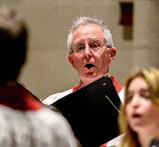






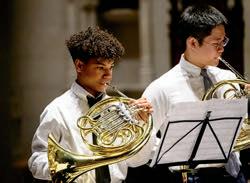




They say there are two sides to every story, and Tarun Khanna’s October 10, 2023, Circle Talk on the dual nature and complex maturation of his homeland was no exception. His hourlong, often interactive lecture, “The Promise and Heartbreak of India,” explored both, from the most populous country in the world’s struggles with inequality to its potential as an economic superpower.
“India, demographically, is about to go through in the next twenty-five years what China went through in the past twenty-five years,” Mr. Khanna said. “China has just been through the most massive boom in modern economic history. If India plays its cards right, it could also see such a massive boom.”
As director of the South Asia Institute at Harvard University and Jorge Paulo Lemann Professor at the Harvard Business School, Mr. Khanna teaches a variety of elective courses, including Contemporary Developing Countries, where students try to ponder solutions to complex social problems. As evidenced by his talk in the
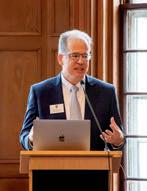
Marion D. Campbell Performing Arts Center, India is full of those complex problems.
“India is one of the most unequal countries in the world,” he said. “Where I grew up was a very fancy, affluent community in Mumbai, but right next to our affluent community was one of the biggest slums in India. This is a thematic pestilence on society and something that needs to be addressed. But it is a fact of life.”
Mr. Khanna explored that harsh reality India’s “heartbreak”— in the first part of his talk. He would often speak directly to and with the Groton student audience (“The one thing that’s common with all the classes I like to teach,” he said. “They’re all interactive.”) or share videos on the auditorium’s screen.
Like much of the world, India has been impacted by climate change, but has little infrastructure to handle extreme heat or catastrophic events like flooding. The majority of jobs are part of an informal economy that remains off the grid and pays no taxes. And, for most people, what we consider health care doesn’t exist.
“We have done a uniquely bad job of providing universal health care to people,” Mr. Khanna said. “That construct does not exist.”
High-school-age children in India have fewer options for education and employment than their contemporaries in America, Khanna said, and the country has been slow to provide much needed opportunity for this generation.
“Part of the heartbreak, I think, is that you have all this amazing human capital, wonderful young men and women deserving of a good life, and all of this inequality,” Mr. Khanna said. The big challenge for India, and for many developing countries, is how do we create the promise of the future for the next generation?”
Despite these challenges, as a self-described optimist, Mr. Khanna said his bias is to see the glass as half full.
“There are so many ways to make a difference, to lead a productive life,” he said. “As my mom used to say to me, ‘Make sure you leave the world a better place.’ But it’s important to be clear eyed about the context within which you’re going to make a difference.”
Fifth Form families gathered on the Circle February 2 to 4 for Groton School’s annual Kickoff to College Counseling event, marking the informal start of the college application process for their students.
More than sixty families joined College Counseling Office staff for the event, which included workshops and panel discussions, a keynote speaker, one-on-one meetings with counselors, and lunch with Headmaster Temba Maqubela.
Groton students meet with the College Counseling Office in the spring of their
Fourth Form year to look ahead at courses they might want to take, but the college application process begins in earnest with the Fifth Form. After the Kickoff event, counselors will have regular meetings throughout the rest of the year to get to know students better, learn what they’re looking for in a college, and start building an initial list of potential targets.
The support follows through to Sixth Form, as students complete their applications and start thinking about things like early decision and financial aid.
Kickoff workshops focused on such topics as Putting Together an Application and Making the Most of the College Visit. In addition, current Sixth Formers CJ Armaly (who acted as emcee), Kritika Aryal, Sheena Bakare, Afrika Gaye, Arjun Ray, and Ellie
Groton School students went out into neighboring communities on October 17, 2023, for a fall day of service, putting the school motto cui servire est regnare into concrete practice.
The event was one in a regular series of campus-wide volunteer opportunities designed to show students how their actions no matter how small can make an impact. Students had the day off from their regular school schedule and were given the chance to choose from a number of organizations in towns throughout the greater Groton area, including Ayer, Acton, Leominster, Lowell, and Pepperell, among others.
“Some of the organizations are ones we’ve worked with before, and some are places we hadn’t but that looked like there was a need for volunteers,” said Director of Community Engagement Elizabeth Phan.
Opportunities included helping as teacher’s assistants at local schools, sorting secondhand clothing and furniture donations, conservation projects and trail clearing, cleaning and organizing at animal shelters and food pantries, and work with local immigrants and refugees, senior citizens, and disabled youths.
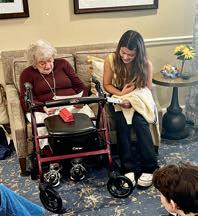
Smith shared their advice on how parents could best support their students during the college search process in a special “Lessons Learned” panel discussion.
Friday night’s keynote speaker was Doug Christiansen PhD, Vanderbilt University’s vice provost for University Enrollment Affairs and dean of Admissions and Financial Aid. Before his presentation, Dr. Christiansen said the key to a successful college application experience is balancing support for your student with empowerment of them.
“I hope parents understand how important it is to let their child be empowered. This is one of the first major decisions their student is going to make, and they’re part of it,” he explained. “It is a student decision, but a family discussion.”
Parents, while well-intentioned, can


“Just knowing that our students live in such a small bubble, it’s really important for them to meet different kinds of walks of life what a refugee is, what an immigrant is, what a person who doesn’t speak English is and see what the reality is outside this bubble,” said Ms. Phan. “Days like this show students how they can interact with the bigger world beyond campus and learn from it so that they can make a direct or indirect impact in some kind of way.
“I hope that they see that connection with people from different worlds is just the most important thing,” she added. “It keeps humanity running.”
sometimes add anxiety to the admissions process by having outsize expectations of what’s realistic or right for their students, Dr. Christiansen added.
“Parents can be part of the hysteria that happens in the admissions process,” he said, “and we need them to step back.”
Approaching the decision-making process without focusing solely on outcome can help take some pressure off a student, Dr. Christiansen said, as can scheduling designated times to talk about college.
“From a mental health perspective, I tell parents all the time and I’ve been doing this for thirty-four years ‘Plan a time.’
Once every two weeks, spend a half hour and talk about your process.
“If you’re talking about it every second, then it starts to become adversarial. Not in
a bad way, but it starts to become, ‘I don't want to talk about college. It’s stress.’”
Dr. Christiansen said events like Groton’s Kickoff not only help parents better understand the process, but also their place in it.
“Parents want the best for their child, but sometimes they don’t know what best is,” he said. “And so having professional people like Peter [Newcomb, Groton’s director of College Counseling] and others that are able to help say, ‘It’s going to all work out. Your kids are going to go to college’ really helps.”

Before he could start his own career as an artist, Mitchell Rembert wanted to finish his father’s.
Mr. Rembert, the 2024 Mudge Fellow, is son of the late Winfred Rembert, whose leather paintings express the horrors he witnessed during the Jim Crow era, laboriously carving striking images of cotton fields, segregation, and Black people in America. Winfred was a (virtual) visiting artist at Groton School in 2020, and his memoir, Chasing Me to My Grave: An Artist's Memoir of the Jim Crow South, won a Pulitzer Prize in 2022.
“Initially, I was going to come out with my own style, just to step away from his particular style and not be trapped in that Civil Rights box,” Mr. Rembert said on campus. “But after my father passed, I was going through his tools to see what I could use and what I should throw out, and found a notebook with his last thirty ideas.”
The elder Rembert had talked about doing one last body of work a summary of his life before retiring. Before he could
finish, however, he died in 2021 at the age of 75 after several struggles with his health.
“When I found that notebook, I said, ‘You know what? Before I tell my life story, I’ll finish telling his,’” Mr. Rembert said. “So that’s why a lot of this artwork has so much of his essence and technique.”
Mr. Rembert’s work shifts from the Jim Crow South to share the perspective of a Black man in America today. Pieces spotlight people like George Floyd and Colin Kaepernick, victims and activists who Mr. Rembert said are antitheses of too many in popular culture who would rather not talk about race or anything else controversial that might hurt their brand.
“We need more people like Kaepernick and Muhammad Ali and Kareem [AbdulJabbar] who are willing to stand up for the culture, even if it means their wealth,” he said. “And I feel like a lot of those rappers, they see the inside of it and they get this wealth and they don’t want to let go of it.”
When former NFL quarterback Kaepernick drew criticism for kneeling
during the National Anthem in protest of police brutality, Mr. Rembert said, the rapper “Jay-Z swept the whole issue under the rug. He’s supposed to be the representative of the Black culture, but says, ‘Aren’t we past kneeling?’ And I said to myself, ‘Hell no. We’re not past kneeling.’”
Groton’s Mudge Fellowship was established by the Mudge Foundation in 1992 to enhance students’ exposure to the arts. Following the opening of his exhibition, Mr. Rembert set up an impromptu studio in the Dining Hall lobby. Students dropped in throughout the week and tried their hand at leather crafting, with the finished pieces added to the wall outside the Brodigan Gallery.
“I got a lot of students and they were high energy and so willing to participate,” Mr. Rembert explained. “You could see they were just giving it their all, and that just warmed my heart.”
“When I found that notebook, I said, ‘You know what? Before I tell my life story, I’ll finish telling his,’” Mr. Rembert said. “So that’s why a lot of this artwork has so much of his essence and technique.”

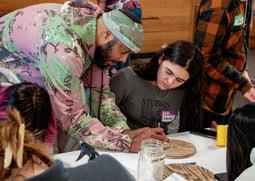

During a week-long residency on the Circle, 2024 Mudge Fellow Mitchell Rembert shared the legacy of his late father Winfred, who was a (virtual) visiting artist at Groton in 2020.


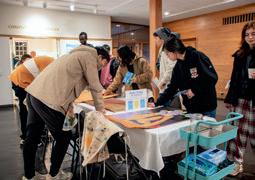
To celebrate the tenth anniversary of GRAIN, we caught up with three recent Groton alumni who were part of the Inclusion Scholars program to see how their time on the Circle changed their lives.

Montanna Riggs’ freshman year at Stanford University ended with the first summer of COVID, when many college students wondered whether to move ahead as scheduled or take a gap year. Montanna suspected a return to Stanford would be a compromised experience, with classes held in a remote or hybrid way. She was eager to continue her education. But not at the expense of quality time there.
“There’s an intentionality about college years. They are an integral part of becoming whoever you’re becoming that makes being online not worth it,” says Montanna, who wanted to be fully on the clock when she went back to what’s affectionately known as the Farm. She ended up taking a year off to work for an ed-tech startup, called Curious Cardinals, launched by Stanford students.
“Some people see college years as a means to an end, but I see it as a place and time to really explore.”
The spirit of exploration has always motivated Montanna, a GRAIN (GRoton Affordability and INclusion) Inclusion Scholar from Boston by way
of the Shady Hill School in Cambridge. The paths she explored in her major areas of interest at Groton—science and music—have blazed into significant avenues. The organic chemistry classes she enjoyed with Headmaster Temba Maqubela have led her to major in bioengineering; the cello she plays as a music minor was a gift received at Groton, from a donor family who had it custom made in South Africa and transported to campus by a faculty member. The time left in the spaces between her major and minor is filled with pursuits as diverse as agricultural technology, runway fashion club and shows, and bioengineering national security research for the FBI
“I think when you come from a culture like Groton where you get to try so many things,” she says, “it just gives you a bug for maximizing opportunities and testing out different interests.”
You don’t have to know what you want to do with your life, Montanna believes, but you have to know yourself well enough to take the next right step, which she characterizes as “putting yourself in positions to be lucky.” Sticking your neck out. Trying new things. Following your enthusiasms. And being receptive to people, and experiences.
This spirit of engagement at Stanford led to her selection as a Mayfield Fellow, an entrepreneurial program known for rigorous training and a robust alumni networking group. There, she was one of twelve students in the year-long track that includes a technology internship in a high-impact field. She chose to work with FarmWise, a Salinas, California–based farming tech firm deploying machine learning and computer vision
weeding for increased productivity and profitability.
“My main project was studying international markets and comparing them to California. The value proposition there is that there are extreme labor shortages in farming. And so in order to protect the yield, in farming, we need a lot of innovation to happen to feed the world,” Montanna says. “I was essentially doing market strategy for them: What are the cultural differences that impact how people buy? And so I was looking at places like Spain, Canada, Mexico, a lot of big vegetable growers, hopping on calls with farmers from the area, hunting them down on LinkedIn. It was pretty cool. I learned a ton about the nuances of agriculture.”
Beyond bioengineering and music, some of her favorite classes have been in the design school. Stanford’s d.school is famous for programs in both disruptive and sustainable technology. In classes like Inventing the Future and Forbidden Design, Montanna found discussions that truly fired her up—on topics like the unintended consequences of human gene editing, and inequities of the profits of industries like cannabis that spring up virtually from scratch overnight. It is also known for asking about the ethics and consequences connected with change-making, particularly since the controversial e-cigarette Juul was invented by its students in 2004.
“The classes are just incredible,” Montanna says. “How do you get people to feel like they have agency about what the future will look like? Because a lot of my generation acts like the future is happening to you, rather than something you’re designing. And part of that is being able to predict and then design around unintended consequences of technologies.” She cites discussions about the ethical consequences of toying with genetic superhumans and designer babies, which are becoming less and less far-fetched as each class graduates. “What does this science mean for the job market and sports and access and all these other things? These cool classes turn ideas on
their head and nothing is too crazy to think about.”
Montanna has already been accepted into a master’s track at Stanford for next year, a graduate program in Management Science and Engineering, which will enable her to keep a hand in synthetic biology and biotechnology entrepreneurialism. “I want to have a say in what that world looks like. I don’t know if that’ll be working at a startup or working in policy or education. There are multiple ways to get there, and I don’t have to do them all at once or even know yet what they are. But I do want to have a say in that world.”
That world, for her, began with Groton, which she believes so thoroughly excels at preparing students for college that it enabled her to thrive at Stanford without ever feeling academically overwhelmed. From the moment she was offered the opportunity to be a GRAIN Inclusion Scholar, she experienced the open door of the GRACE (GRoton Accelerate Challenge Enrich) summer program, and the domino effect of things made possible, from advanced courses to faculty relationships and exposure to a global student body and to travel.
“I was encouraged to take
advantage of GRACE to skip ahead in some subjects like chemistry and go in at a higher level. I think it’s really cool that these opportunities exist, and when you have such strong personal relationships with teachers, they become so much more invested in your academic journey and success. It’s such a powerful thing,” she says. “There’s just so many points of access, like crossroads, almost. I look back and I’m like, ‘Oh, most people don’t really have those opportunities.’ It’s a place I’m extremely grateful for.”
Family for Montanna consists of her mother (her father died when she was young), her pets, and extended relatives in Boston. Her mother hadn’t known what to expect of Groton when the acceptance letter first arrived, Montanna says, because they weren’t really familiar with the boarding school world. But when the true meaning of the scholarship sank in, it was with a sense of awe that the school would really walk the affordability walk.
“My mother was really struck by how much actual power was put behind the GRAIN program,” Montanna says. “I think Groton is really progressive on a lot of fronts, and puts their money where their mouth is.”
—Nichole Bernier


When Andrew Mazza was in his Third Form, a prefect in his dorm was accepted into the Naval Academy. The following year that graduate came back to visit Groton as a midshipman, and his observations made a strong impression on Andrew.
“He said it seemed like either the Naval Academy was based off of Groton, or that Groton was based off the Naval Academy—that they are so closely entwined in their values and sense of honor,” Andrew recalls. “That put it on my radar, and I began researching it as a college option.”
Now wrapping up his final semester in Annapolis, Andrew has made honor a key component of his undergraduate experience. He holds an elected post— Brigade Honor Advisor for Investigations—that’s a bit like being a class president who’s gatekeeper of ethical behavior and discipline. His passion for science at Groton put him on a path toward a medical career in the Navy, and his experience of affordable education as a GRAIN (GRoton Affordability and INclusion) Inclusion Scholar fuels his appreciation of the military’s financial career scaffolding. The insights of his former prefect were prescient, connecting the dots between the values he loved at Groton, and where he could find them at college.
Andrew’s identification as a STEM kid dates back to his childhood up in Queens, where he lived with his mother, an educator who ran teachers’ professional development programs in New York City. He remembers tagging along on her expeditions to the Museum of Natural History, testing out semi-scientific experiments alongside faculty members: peering at bits of strawberries under a microscope, and extracting samples from Chinatown meals to see if the meat DNA matched its menu listing (not always).
Attending boarding school was not part of his family’s experience, or budget. But the notion of living with a large number of kids his own age was irresistible. An only child, he spent a good bit of his time alone at home after school, or running across the street to his grandparents’ house, where cookies were usually baking in the kitchen. Groton’s intimate, family-oriented feeling—from parlor
cookies to mentoring younger students to lightsaber wars in the dorms after dark—spoke to him. So did Groton’s generosity with scholarships.
“We were what Mr. Maqubela described as ‘the missing middle,’ where on paper it looks like we can afford it, but it’s not realistic,” Andrew says. “I remember as an eighth grader being amazed and touched that someone wanted to pay for me to come to their school. Being able to go to a school I shouldn’t have been able to attend was tremendous, and I’m really thankful for that.”
The summer between his Third and Fourth Form years is when Andrew cemented his love of chemistry. He’d attended a seven-week sleepaway camp where personal electronics weren’t allowed, and he was permitted to bring one book. By the end of that summer, he was on such familiar terms with his chemistry textbook that he was able to zip through placement exams and qualify for AP Chemistry. From there he devoured organic chemistry, organo-

carried an echo of Groton’s values: serving as the Brigade Honor Advisor for Investigations. In the Naval Academy, a student accused of an infraction of honor—cheating, stealing, lying, plagiarizing—goes before an honor board of their peers. That board is tasked with investigating the accusation, writing a report, and presenting it to the Brigade Honor Advisor for Investiga-
career path in the Navy, in medicine, and perhaps someday, in managing a hospital.
“There are certain intangibles that a civilian school won’t necessarily teach you. When push comes to shove, if someone is needed to take on other duties, or check in on everybody, or step up for your colleagues, that’s what we’re taught here. We’re taught to care for
Being able to go to a school I shouldn’t have been able to attend was tremendous, and I’m really thankful for that.
metallic chemistry, and whatever else was available to him at Groton. And it led him to discover an area of interest within medicine: anesthesiology.
“I’m fascinated by how chemicals affect our bodies. It’s just wild how it works—the effectiveness of it, the ability to wake someone up on demand, it’s all incredible,” he says. “It’s a specialty that’s not too bloody, not too intense, but it’s important and vital to the team and to any operation. It’s dynamic. I can deploy with any unit—Seals, submarines, surface warfare, civilians, on the water, on the ground, you’re going to need an anesthesiologist on hand.”
A pre-med course load is notoriously time consuming. But Andrew’s main extracurricular activity dwarfed even the time commitment of studying, and
tions, who issues a recommendation. A midshipman can be found not in violation, and their record cleared; stay at the Academy, and go through remediation to clear their honor; or they can be separated from the school (expelled). This level of peer disciplinary oversight is no small commitment; earlier this year, Andrew had to recommend separation for a first-year student.
“It’s a big responsibility that has affected me a lot, knowing I played a role in ending someone’s career as a naval officer. But I came to terms with it,” he said. “It’s important to discover dishonorable tendencies now rather than when they’re handling guns or on a ship or committing war crimes.”
It’s an uncommon amount of leadership for a college student. But Andrew sees it as well aligned with the experience and growth needed for a
other people, and to lead,” he said. “I think Groton does the same thing, just in a non-military manner.”
That ethic is made tangible in the Naval Academy’s Memorial Hall, inscribed with the name of every graduate who passed away in service; at Groton, too, in the back of the Chapel. Andrew recalls going to services there and being astonished at the sheer volume of names from 1938 to 1942.
“I don’t know what impact that has on others, seeing that every week. But I would think, damn, they probably just came to Groton planning to go to a good college, but decided to join the military because that’s what was needed of them at that time,” he says. “The message of service and honor is so strong at Groton, and now I can envision it.”
—Nichole Bernier

Lily Abha Cratsley saw her name in lights on Fairfax Avenue in Los Angeles and panicked. She had been dreaming of a moment like this since she was a kid. Still, as a new playwright, she couldn’t believe that it was actually happening: A giant marquee that read “American Born Confused Desi by Lily Abha Cratsley.” Her very first play was being produced and she found herself looking head on at her dream.
In many ways, that dream started at Groton, when Lily entered as a “very, very eager student in the Third Form.” She had fallen in love with theater at a camp when she was seven, relishing the permission to “be loud and be bold.” So as a new student at Groton, coming from Leominster, Lily entered boldly. She reached out to Director of Theater and Dance Laurie Sales before auditions were even held to understand what was possible for her in this new place. Lily remembers Ms. Sales “quickly took me under her wing and pushed me really hard” to take theater more seriously.
As a biracial student—half South Asian and half white— Lily often worried how she might show up on stage. Before Groton, she remembers, “I was so hyper conscious all summer of getting too tan and then not looking like a von Trapp sibling [in a production of The Sound of Music]. I loved being in this space with Laurie where that wasn’t a concern at all. I could be any sort of character I wanted to be and not be conscious of that.”
After Groton, Lily enrolled in a playwriting course at Occidental College. “When it came time to write the first scene, it sort of flowed out of me.” She wrote from her own experience, trusting that it would resonate with audiences from vast backgrounds. “I really felt that, if I just made it as authentic and true as possible, other people would still relate to it and there would be the universal inside of that as long as it was authentic and real to me and my experience and my family’s experience.”
All students were required to submit their plays to a festival, so Lily submitted hers, American Born Confused Desi (ABCD), and won. The chance to get ABCD produced led to an opportunity for Lily to meet Reena Dutt, a South Asian director and producer. Lily recalls “meeting her and

school for the blind in India, where her family lived. She returned to Groton feeling very aware of her biraciality. “That was really, really difficult for me— not feeling brown enough, not feeling white enough. In any space, not understanding where I fit in.”
When she returned from India, she asked if she could start a South Asian Affinity Group (SAAG) that remains active today. Her reflections after her travel led her toward a discomfort that eventually opened into growth. And many of those emotions that were a part of her development fueled her creative work as a playwright.
“One of my professors at Occidental introduced me to this incredible language that I love to share with people. She talked about how being Indian American is having your identity not rooted in India and not rooted in
If I wrote a story true to me it would have to be true to other people as well. There was no way I was the only one feeling in these ways.
realizing that there was this community out there, that people would hear our stories and there was space for us in this industry.”
As she connected with other Indian artists, Lily finally received the feedback that she had sought for years. “The sense I got from this production was that I had achieved my mission of writing a play specifically for my community.” But the play reached beyond her community, too, and she began to see the truth in her story resonate with all kinds of audience members. “‘I feel like I saw myself for the first time.’ That was the sense I always had: If I wrote a story true to me it would have to be true to other people as well. There was no way I was the only one feeling in these ways.”
THE RESOURCES TO FLOURISH
Lily learned to trust her own voice, but not all at once. Her time at Groton was a foundational part of that process. As a GRAIN (GRoton Affordability
and INclusion) Inclusion Scholar coming from an underfunded public high school, Lily felt a bit of culture shock when she first enrolled. It helped that she was a part of a cohort, she recalls, and that she quickly connected with other GRAIN scholars. “I found that the students that I related to the most and made some of the strongest friendships with were other students on financial aid who could relate to that struggle of figuring out, ‘What is this world?’”
The GRAIN initiative played a big role in her ability to attend Groton. “Being an Inclusion Scholar and going to Groton changed my life,” she said. “By giving me all the resources Groton gave me, I was able to flourish in a way that I really don’t think I would have been able to had I stayed in Leominster. I’m really grateful for that opportunity.”
In her Third Form, Lily was awarded a Groton Opportunity for Leadership Development (GOLD) Grant, which allowed her to work at a
America but somewhere in between, floating in the ocean. I thought that was a terrifying concept when I was in high school. I thought the idea of floating and having no ground as being something really difficult and scary and unfair.”
Rather than getting stuck in that fear, Lily continued to explore and grow and write. Today, that very uncertainty is what motivates her. “Through my art I’ve decided to claim the water. Claim how fluid and powerful my identity is in that it flows and is not grounded. That’s what’s really fun about being an artist is getting to embrace that sort of liminal space.” When her next production, The Fairy Who Cried Gems, opens in June and she sees her name on the marquee, she won’t panic. The opportunities she has earned, and the worlds that she has experienced—from Leominster to Groton to India to Los Angeles—allow her today to lean in to the unknown. To claim the water.
—Meredith McCarroll
IBY SEAN KERRIGAN
n a November 2014 letter to the Groton community, the GRoton Affordability and INclusion initiative—better known as GRAIN—was born. “For some time, the Board of Trustees has been concerned about the increasing cost of private education, the rate at which it has outpaced income growth, and the fact that exceptional education has become increasingly unavailable to most families,” said Headmaster Temba Maqubela and then-board president Jonathan D. Klein P’08, ’11, ’18. “The Board of Trustees believes that now is the time to make sure the school is not only among the most selective, but also the most welcoming.”
By freezing tuition for three years—another freeze would come when inflation was high this past 2023–24 school year—and considering all qualified applicants regardless of their families’ ability to pay, Groton’s trustees made the school’s number one strategic priority a commitment to affordability and inclusion.
Over the next decade, the GRAIN mindset would transform Groton.
Vuyelwa and Temba Maqubela arrive at Groton
July 2013
GRAIN adopted by Board of Trustees
GRAIN receives first $5 million gift
November 2014
February 2014
$1 million gift solidifies idea that would be GRAIN
As the GRAIN initiative evolved from a movement to a mindset, the momentum it generated influenced all areas of life on the Circle and stimulated robust support for the people, programs, and spaces that define the Groton experience.
The energy generated by the “GRAIN mindset” translated into historic fundraising success over the past ten years, and earlier this
First five Inclusion Scholars arrive at Groton
Renovated Schoolhouse opens September 2015
June 2015
Total raised for GRAIN reaches $14.6 million
$5 million challenge grant issued May 2017
June 2016
Total raised for GRAIN reaches $21.4 million
spring the total raised since 2014 crossed the $200 million mark. Just over $90 million of this total raised to date is direct support for the GRAIN initiative’s focus on tuition containment and affordability, and more than $50 million has been given in support of the Groton Fund, the school’s annual fund for current use. The remaining $60 million has been given in support of various projects that align with GRAIN,
First GRACE program
Third $5 million gift pledged
July 2017
June 2017
Total raised for GRAIN reaches $32.4 million
The first GRAIN campaign closes at $53 million
June 2018 Sunset Farm purchased by Groton
December 2017
$1.4 million gift brings GRAIN funds raised to $50 million goal
April 2019
September 2018
Number of Inclusion Scholars reaches 20
Groton’s student body is more diverse than ever, both culturally and socioeconomically.
Tuition, which was once the highest among forty secondary-school peers, is now the lowest and a model for all independent schools.
Strategic Framework 2030 was adopted, building off the success of GRAIN to ensure inclusion and belonging remain at the center of life on the Circle.
Fundraising enjoyed its most successful period in modern times: Since the anonymous $5 million gift that kicked off GRAIN in 2014, the momentum generated by the initiative has lead to historic fundraising overall, and giving to Groton has topped $200 million through the generosity of alumni, parents, faculty, staff, and friends.
And, thanks to GRAIN, Groton has asked itself an existential question: Can one of the great independent schools in the world cast off the stigma of elitism while still remaining elite?
including the GRACE (GRoton Accelerate Challenge Enrich) Summer Program, faculty chairs, faculty housing, sustainability, a new track and field facility, a historic $15 million gift in support of long-term financial stability, and more.
“In my twenty years at Groton, I have never seen such an overwhelming response as I did with GRAIN,” said Director of Development and Alumni Affairs John MacEachern P’10, ’14, ’16.
GRAIN 2.0 begins
March 2020
September 2019
Dining Hall renovations completed
Gardner Village completed and first faculty families move in
August 2020
May 2020
Solar Array and Goodenough
Lithium Ion
Battery installed
“The idea of a level playing field, inclusion, and access for all applicants regardless of financial circumstances resonated deeply with our alumni and parents. Besides raising more than $90 million for tuition containment and financial aid, it spurred fundraising in general to incredible levels. The success of GRAIN is a testament to our community and what it values.”
These projects, combined with the adoption
Four new sculptural busts added to the Schoolroom
Trustees adopt Strategic Framework 2030
November 2021
March 2021
Anonymous donor gives $3 million to support school operations through COVID
Groton achieves lowest tuition among 40 peer schools
April 2022
December 2021
Total raised for GRAIN crests
$74 million
of Strategic Framework 2030 and additional improvements pursued apart from fundraising, advance the school’s mission to inspire lives of character, scholarship, leadership, and service within a diverse, inclusive, and close-knit community. Although GRAIN fundraising will officially cross the finish line in the fall, the mindset has become part of Groton’s ethos and will influence the school long into the future.
First G-PIE held at Groton
July 2023
September 2022
Number of Inclusion Scholars reaches 25
Historic $15 million gift from anonymous alumnus
March 2024
August 2023
Sturgis House renovation completed
Renovation of Schoolhouse wellness spaces are completed
April 2024
The Vuyelwa and Temba Maqubela Track and Field is dedicated
Milestone reached: $200 million raised since 2014!
How GRAIN’s cost containment effort took Groton from highest tuition to lowest
GROTON SCHOOL
In 2014–15, Groton tuition was highest among forty peer schools, an unappealing distinction. As a result, Headmaster Temba Maqubela and the Board of Trustees agreed that bold action was needed to dramatically improve the situation.
GROTON SCHOOL
Following a three-year tuition freeze and dedicated cost control in the years that followed, Groton is now lowest in that cohort, with a ten-year compound annual growth rate that’s just a third of its peer schools’ average.
IN 2014, Groton School was on the steady path to a dubious first. Over the previous ten years, tuition had grown at a compound annual growth rate (CAGR) of 5.3 percent. With a 2014–15 tuition of $55,700—highest among forty secondary-school peers—continuing at that pace, even at the average secondary-school CAGR of 3.5 percent at the time, meant the cost to attend Groton would have gone past $75,000 by 2024 and broken six figures by 2032.
“The vexed issue of the cost of education was one that troubled the board for some time and Temba decided to take it on in a typically bold and visionary way soon after he became our headmaster,” recalled Mr. Klein. “It was important to have the entire Groton community behind the plan and so it was made clear, at every meeting, that GRAIN was the number one strategic priority for Groton School.”
GRAIN flipped the equation by freezing tuition for three school years. While such a drastic change came at a
cost, trustees at the time pointed out staying on that path to a tuition of $100,000 had a cost as well.
“A tuition freeze isn’t a cost, it is a forgone revenue opportunity,” said Trustee William Gray P’15, ’23 in the Fall 2015 Quarterly “Raising tuition also has a cost, mainly in the form of a more restricted applicant pool.” [See “Investing in the Ultimate Appreciating Asset: Young Minds,” below, for an update from Mr. Gray.]
With the freeze and dedicated cost control in the years that followed, Groton’s compound annual growth rate over the past ten years has been 1.1 percent—just a third of its peer schools’ average of 3.2 percent. And while Groton has gone from highest to lowest in its cohort, the top tuition in that group has since reached $79,500, 44.5 percent more than what Groton was in 2014.
Beyond the bottom line, GRAIN has changed the makeup of the Circle, and of the Groton experience itself. Financial aid has long tried to bridge the gap between those who could afford tuition and those who couldn’t,
continued on next page
by Will Gray P’15, ’23, TR’13–
GRAIN has been transformative for Groton School. The single-minded focus on inclusion has measurably improved the learning environment while delivering on the seemingly contradictory goals of lowering fees while improving the financial strength and resilience of the school.
And so much more can be done. Groton’s faculty, staff, leadership and facilities are critical, but the student body is what makes the Groton experience, its soul and its future. At its essence, GRAIN is an investment in building the very best student body possible. On the surface, it breaks down financial barriers to attendance. But at its core, it enhances and enriches the experience for every student as it broadens the range of perspectives embedded in the student body and enhances their own sense of belonging. It plants the seed of seeing difference as empowering rather than dividing in young minds.
Nobody can see the power of this more clearly than a parent looking for the best
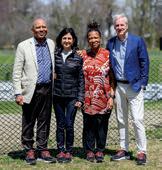

a stronger, broader, and deeper applicant pool, more engaged parents and a healthier and more resilient financial position, all while being more accessible than any peer school in the country.
None of this would be possible without the impressive facilities and environment which make the Groton Circle, but those are material, and depreciating assets. Young minds are appreciating assets, with a lifetime of compounding ahead of them.
GRAIN has shown that the highest return investment we can make is an investment in drawing in that next student who deserves to be on the Circle, but isn’t. Ten years on and having reached well beyond our initial aspirations, it might be tempting to think we’re done. But perhaps we have only just begun.
for their child, and the support for GRAIN shown by Groton parents is I think the most powerful testament to its impact on the school. The result is a school which has
That is what I believe. We have performed a proof-of-concept, and it has shown itself to be a resounding success. We’re not done yet, and I am excited to see what Groton will make of that opportunity.

“This is a journey, not a destination, something that requires perpetual diligence, support, and advocacy from the entire Groton community: students, faculty, staff, alumni, parents, and past parents.
by Board of Trustees President Benjamin Pyne ’77, P’12, ’15
If GRAIN is designed to increase accessibility and affordability at Groton in order to attract a more diverse student body to the Circle, then the strategic framework that followed is a commitment to bringing this new community closer together and hearing each and every voice.
Groton’s mission is “To inspire lives of character, scholarship, leadership, and service within a diverse, inclusive, and close-knit community.” What better way to continue the progress we have made through GRAIN than by actively supporting and advancing that mission?
but it usually left out what Mr. Maqubela has termed the “missing middle”—those families who either didn’t qualify for aid or, with the similarly increasing cost of a college education, never thought of independent schools like Groton as an option for their children.
“When Temba proposed this concept, no one else in academics was thinking about the ‘missing middle,’” said Trustee Ann Fox ’94. “In fact, many of our colleges and universities seem to have totally left them behind when it comes to affordability. But Temba always asks who is not at the table.
“The tuition freeze enabled families in the missing middle to both remain at Groton and to consider joining the school,” Ms. Fox continued. “I gather many people felt this initiative would fail at the outset. But it was the right thing to do.”
The Groton community at large has overwhelmingly agreed. Of the $200-plus million raised since GRAIN’s inception, more than $90 million has gone toward tuition and cost containment—the largest effort per student for financial aid by any boarding school in more than a decade. The balance has supported new initiatives like GRACE (the GRoton Accelerate Challenge Enrich summer program) and 2023’s inaugural G-PIE (Groton Program for Intercultural Exchange) conference, as well as capital projects that improved the Schoolhouse and faculty housing and built a new solar array and track-and-field continued on page 29
“GRAIN has put us in a position of leadership among our peers with regard to inclusion and affordability. The strategic framework maps out a pathway for building off that position, “to consolidate and advance the progress we have made as we evolve into an even more diverse, inclusive, and close-knit community,” as the framework explains so well.
Groton has always had a set of core values and guiding principles that has guided the school since its founding. By establishing a set of clearly defined objectives around our five foundational
When Temba proposed this concept, no one else in academics was thinking about the ‘missing middle.’ In fact, many of our colleges and universities seem to have totally left them behind when it comes to affordability. But Temba always asks who is not at the table.”
elements Affordability, Well-Being and Social/Emotional Development, Inclusive Excellence in Scholarship, An Inclusive Campus, and Community Ownership of Inclusion and Belonging the strategic framework harnesses the promise of GRAIN into something our entire community can believe in.
Nearly halfway into this ten-year plan, the results speak for themselves.
GRAIN’s bold vision of making a Groton education affordable to all talented students has taken us from highest tuition among peer schools to lowest. This has opened up our doors to a broader set of candidates than ever before, including those from families in middle income brackets. Today, Groton is truly need blind when it comes to admission and no student is turned away because of financial need.
Our faculty and staff continually foster an environment where health and wellbeing are prioritized and all students feel
Thanks to more than $90 million raised through GRAIN for tuition and cost containment, the missing middle is no longer missing at Groton.
supported and safe to pursue their passions. Students are put in a position to thrive academically and fulfill their promise as scholars. Our curriculum is constantly evaluated to remain relevant, inclusive, and responsive to today’s world. Now in its ninth year, the GRACE (GRoton Accelerate Challenge Enrich) Program a four-week summer session that allows rising Fourth Formers to accelerate access to more advanced courses or fill any preparation gaps has never been more popular. Groton has also expanded its GEO (Global Education Opportunities) offerings to ensure that all students have the chance to learn about and experience the world beyond the Circle.
We continue to invest in maintaining an inclusive campus, with recent renovations to the counseling and academic skills spaces in the Schoolhouse and to the Health Center in Hundred House and the opening of the new Maqubela Track
and Field Facility, which in short order helped deliver the boys team’s first ever New England Preparatory School Track Association championship.
And, by tapping into that GRAIN mindset, we have nurtured the culture of inclusion, belonging, and well-being that is now central to the Groton experience. This is a journey, not a destination, something that requires perpetual diligence, support, and advocacy from the entire Groton community: students, faculty, staff, alumni, parents, and past parents. We must all do our part.
Groton has been blessed with a long history of leadership in secondary education. Under the guide of the strategic framework, I know we will continue this progress and discover new ways to make our mission come to life.
To read Strategic Framework 2030 please visit www.groton.org/strategicframework
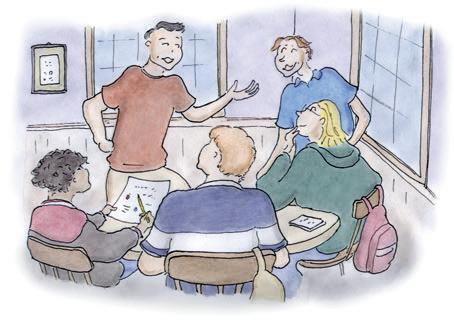
“Reflecting on my time as a student, Groton has transformed significantly through GRAIN. The increased financial aid has diversified the student body, enriching the educational experience for everyone.

by Diana Ferguson ’81, TR ’15 –, former Board of Trustees treasurer
Five years ago, I viewed GRAIN as a continuum rather than a finite project, and that perspective remains unchanged. Without a doubt, there has been significant progress due to the steadfast commitment of Vuyelwa and Temba Maqubela and the generosity of the Groton community, all of which has allowed the school to keep tuition increases modest, add more Inclusion Scholars, and further solidify the GRAIN mindset in our strategic decision-making. Initially, I truly marveled at the success of GRAIN, and particularly the breakneck pace at which we met and exceeded fundraising milestones. Over time, as the initiative has gained traction, I am less and less surprised. I believe a powerful message of access and inclusion that resonates globally, steadfast leadership who have made GRAIN the school’s top strategic priority, combined with an incredibly generous Groton community of parents and alums, are the ingredients that have made the magic happen. This response underscores the deep trust and belief in Groton’s mission.
However, as we appropriately celebrate these accomplishments, it is important to recognize that the journey is far from over. Ongoing efforts are necessary to maintain and further enhance affordability and inclusion, ensuring that Groton remains accessible to talented students from all backgrounds.
While GRAIN is pioneering, the rising costs of education are a universal challenge. I anticipate that more schools will adopt similar initiatives as they recognize the imperative of making education affordable without compromising quality. GRAIN has set a precedent that I believe many will follow, driven by the need to attract and support diverse student bodies.
For schools contemplating a similar initiative, I would emphasize the importance of a clear, compelling vision that resonates with your community’s values. Collaborate closely with your financial officers to develop a sustainable model, and communicate transparently about the program’s goals and impacts. Engaging alumni, parents,
and other stakeholders early and often is crucial. The success of such programs hinges on broad-based support and a shared commitment to the institution’s long-term vision.
Reflecting on my time as a student, Groton has transformed significantly through GRAIN The increased financial aid has diversified the student body, enriching the educational experience for everyone. This shift fosters a more inclusive environment where all students, regardless of background, feel a sense of belonging. GRAIN has fundamentally strengthened Groton’s commitment to equity and excellence, making it a more vibrant and inclusive community.
facility. In addition, Groton received a groundbreaking $15 million donation this past year—believed to be the largest in school history—that will support the school’s longterm financial stability. The anonymous alumnus hailed the wisdom of GRAIN as a key factor in their willingness to make such a gift.
“I saw a problem of tuition affordability for what later came to be called ‘the talented missing middle,’ and a need for tuition moderation for all families,” the donor said in a letter to the school announcing his gift. “Among other considerations, Groton had to be mindful of the importance of ensuring access for the children of families which were neither at the top nor at the bottom of society’s income spectrum, and it had to guard against the possibility that the school eventually would price itself out of its market unless it strove purposely to hold its rate of tuition increases over time to at or below the level of general inflation.
“Beginning in 2014, GRAINs I and II addressed these issues, and by 2023 they succeeded in lowering Groton’s tuition from the highest to the lowest among its forty ABOPS [Association of Business Officers of Preparatory Schools] peer schools,” he continued. “This remarkable achievement pretty much took the subject of tuition affordability and moderation at Groton off my worry list.”
Besides boosting the overall percentage of Groton students receiving financial aid to 40 percent, GRAIN also committed to admitting five Inclusion Scholars each
“
Groton had to be mindful of the importance of ensuring access for the children of families which were neither at the top nor at the bottom of society's income spectrum.
year for four consecutive years, until the total reached twenty-five, a level now maintained [for a peek at what some of those students have achieved in their time since graduating, check out the Personae section starting on page 16]. Beyond their financial situation, Inclusion Scholars are chosen based on their potential to spread the spirit of inclusion on campus, and Groton’s legacy of service in the world beyond the Circle.
On an even larger scale, in November 2021 the Board of Trustees adopted a new Strategic Framework 2030, working from the promise of GRAIN to build a bridge from the access given by inclusion and belonging to the success a truly diverse Groton experience can give its students [see sidebar “Harnessing the Promise of GRAIN,” page 26].
A Groton embrace indeed.
continued on next page

GRAIN Inclusion Scholars are chosen based on their potential to spread the spirit of inclusion on campus, and Groton’s legacy of service in the world beyond the Circle.
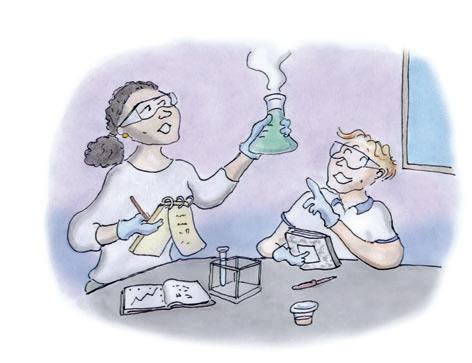
IN HIS message from the Headmaster in the Winter 2015 Quarterly, Mr. Maqubela remarked on how the GRAIN initiative, even in its early days, had clearly hit a nerve.
“We anticipated support, as well as some good questions and perhaps some skepticism,” he wrote. “What we didn’t anticipate was the effusive outpouring of approval and enthusiasm. The reaction—your reaction— has been humbling and reaffirming.
“The responses to our announcement demonstrated how much the ideal of inclusion means to Groton graduates, parents, and friends,” Mr. Maqubela continued. “That should not be surprising: ever since Frederick Law Olmsted and Endicott Peabody were hatching the idea of an open Circle, Groton has focused on opportunity and inclusion. Over the generations, my predecessors stewarded these core Groton values with great care. I’m proud to be associated with them, and with all of you.”
That nerve struck a decade ago is still echoing today.
“Thanks to the efforts and generosity of many, we achieved our goals in record time,” said Mr. Klein. “GRAIN has changed the face of the school and played a
key part in the drive for inclusivity and diversity at Groton.”
“Inclusion isn’t possible without affordability, and an objective of our strategic vision was to be the best at developing scholars and good human beings while also maintaining our affordability amongst peer schools,” said Ms. Fox. “We seem to have found a common human bond across borders for many people in their desire to support this objective and to impart on these young future business, community, and global leaders the absolute importance of inclusion and belonging.
“At the end of the day, if the kids cannot see what is in the realm of possible for a cohesive community then they won’t necessarily have the desire to achieve that in the future—it’s precisely why this is all so important,” she continued. “I have faith these kids will help create more peace than war in their lifetimes, and that alone gives me a lot of hope.”
“GRAIN gave us the luxury of not only asking who is here but also who is not here,” said Mr. Maqubela. “Perhaps this centuries-old question can finally be answered when GRAIN achieves a century in fundraising.
continued on page 32
Five years ago you said, “At a school like Groton, you want to continue to uphold the highest possible academic standards with no compromise. At the same time, you can be an elite school with a soul, with a generous heart. I believe GRAIN represents the spirit of equal opportunity and inclusive meritocracy.” Can you expand on that concept of inclusive meritocracy?
Well, it means academic excellence not by exclusion, confined narrowly to a small privileged group of nearly identical backgrounds, but excellence out of a broad pool of bright young people from diverse social and economic backgrounds. Note that the inclusiveness GRAIN aims at achieving will not be at the expense of academic quality and excellence. On the contrary, by expanding the candidate pool or base from which we select students, we can potentially raise the standards and enhance the learning experience for everyone at Groton.
Do you feel GRAIN has continued to live up to that spirit over the past five years?
Yes definitely. GRAIN has attracted exceptional kids to Groton and enabled them to pursue the best-in-class secondary education at Groton they might otherwise have been unable to afford. It is transformative for these kids and positively impactful for the Groton community at large.
“By expanding the candidate pool or base from which we select students, we can potentially raise the standards and enhance the learning experience for everyone at Groton.

Dr. Hu, as an economist, how did you first react to the concept of GRAIN? Has its success over the past ten years surprised you?
The world we are living in is increasingly divided and polarized by inequality. There is overwhelming evidence from economic research that demonstrates education as the greatest equalizer of opportunities. GRAIN ensures that well qualified and highly promising kids are able to receive a Groton education so that they can have a thriving career ahead and make a significant contribution to the world. The success GRAIN has achieved is not really surprising but definitely encouraging and reassuring.
The cost of education, including tuition and capital projects, continues to go up, and some are
questioning whether that cost is worth the value. Looking forward, do you think GRAIN will remain an outlier, or will more schools look to do something along the lines of GRAIN?
It is true that the cost of education has gone up across the board, not just at selective boarding schools like Groton but more broadly, impacting higher education as well. Recent inflations may have well aggravated the situation.
It is now even more imperative to mobilize resources to attain the desired goal of inclusive meritocracy while improving the cost effectiveness and operating efficiency of the private education model. We are pleased to see Groton as a trailblazer, and we expect more and more peer schools to introduce initiatives like GRAIN
“Once achieved, Groton will once and for all be accepted as elite, dynamic, and relevant—finally able to shed the ‘elitism’ that is associated with schools burdened by the socioeconomic barbells of haves and have nots,” he continued. “As the economist Dr. Fred Hu has said when referring to GRAIN [see “The Power of Inclusive Meritocracy,” page 31], we will become at last a true ‘inclusive meritocracy.’
“At that point—rather than static GRAIN, where a tuition freeze is a statistic—it will be dynamic GRAIN, where the distinction between elite and elitism will be clear to everyone.”

Groton will once and for all be accepted as elite, dynamic, and relevant — finally able to shed the ‘elitism’ that is associated with schools burdened by the socioeconomic barbells of haves and have nots.
Beyond its tremendous fundraising success, GRAIN has become a mindset that’s transformed the Groton experience.
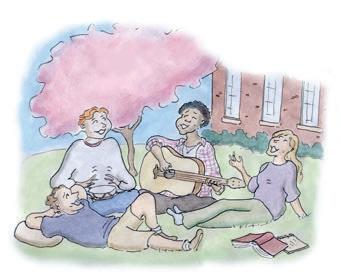
Setting a new standard for inclusion
by Oliver Weisberg P’22, ’23
Ifirmly believe that the best educational environments are ones that have students from very diverse backgrounds this is something I experienced back at Harvard College. Being able to embrace different opinions is paramount for our next generation so I had no reservations about GRAIN from the moment I learned about it.
GRAIN is built on the great idea of inclusion, but equally important is its focus on including students who would otherwise not have access to Groton School. This allows Groton to continue to attract the best talent, irrespective of socioeconomic backgrounds, and talented children will have the chance of accessing a Groton education.
The costs associated with such programs were in the past out of the reach for secondary schools — Groton’s leadership in bringing this to the secondary school level is transformational and bold.
The success of GRAIN is clearly driving other secondary schools to follow in the same path. I believe Groton continues to set the standards both within and outside of the classroom and we will see more schools look to implement similar programs of their own.

by Ebunoluwa Lawore ’24
January 5, 2024
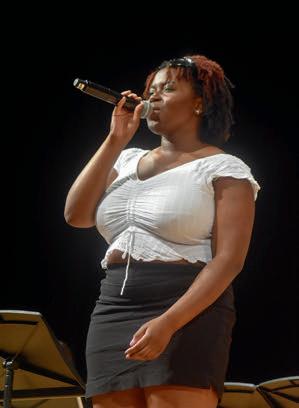
On May 26, 2023, I sat in the practice rooms, my hands resting on the piano keys. D-major came to mind. D-major. D–F-sharp–A. D. D–F-sharp–A. D.
Soon familiar eyes peaked through the window. Of course Will was using his senior skip day to spy on me in the practice rooms. He asked me what I was doing. I told him.
“I’m writing a Christmas carol.”
Before you think that I often write Christmas carols for fun, let me clarify that I was working on my composition project for AP Music Theory. That week was Spirit Week and the theme of the day was Christmas in May. So I thought that I would write a Christmas carol for my project.
Soon Christmasy words came to mind. Manger. Wisemen. A star shines brightly in the east. I wanted a light, feminine harmony. I wanted it to be delicate, yet striking. Sopranos and altos only. I need more harmonies. Sopranos 1s, soprano 2s, and altos.
Soon, the bell rang.
Although my writing session had ended, the song lingered in my mind, as most of my musical projects usually do. D-major. D–F-sharp–A. A star shines brightly in the east. A day later it still followed me, all the way to the orange couch in the Library.
Although it’s removed from the music wing, a lot of music happens on that couch. It was there where I neglected studying for my APs and instead wrote my first psalm. Where Will often sat down and asked to listen to a song I was working on. But it wasn’t only my music. There were also the sounds of people sinking into the couches after a long day of classes. There was the crackling of the fireplace and the different tones of voice
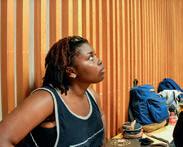
“Sometimes it’s hard to be proud of yourself. You don’t want to seem arrogant or selfabsorbed. And as a musician, you don’t think you matter as much as talented athletes or intelligent students.

for different conversation topics. When my friends would sing my name, and I would sing back to them. There were the walkie-talkie beeps, TikTok sounds, and even the silence, when I would rest my head on Kyra’s lap. With all of this music I didn’t really need a piano in order to be inspired. That was the music that I used to write. So I sat down and I thought about secondary chords. A–C-natural. I will remember what I give. Soon Olivia walked by.
“Ugh, I can’t sit in here,” she said. “I need to write Ebun’s Prize Day letter.”
It was the day before Prize Day. In twenty-four hours the music by the couch was gone. Half of it graduated, and the other half was locked away, either crying or studying for their exams. There was nothing left to inspire me. But I still had to finish my project. It counted for 25 percent of my grade. So the final pieces of me poured out onto my computer. I didn’t even have the energy to type in the lyrics. I just saved the PDF and pressed submit.
A few days later, the other new choir prefects and I packed ourselves into Mr. Moriarty’s car. We went to Osawa to discuss plans for choir in the upcoming year. It was here that I told Mr. Moriarty about the carol I wrote and how it still needed work.
Amelia asked me, “How do you even write these things?”
I responded, “I guess after listening to music for a long time you start hearing the melodies in your head.” Mr. Moriarty then accused me of having voices in my head.
“Maybe you need to get that checked out,” he said. Back to my response to Amelia’s question. The thing is, I’ve been listening to music my whole life. My childhood was full of Kidz Bop and Disney Channel original movie musicals. But back then I never had
any interest in making my own, original music. So what changed?
As a kid, music was always a fantasy to me. I attempted to live the pop star life, but my birthday money couldn’t pay for the Disney audition fees and no music executives ever showed up to my recitals. The life I wanted was trapped inside of my TV screen. That world is full of fame and fortune, but it's also full of other musical people. I think that’s what I really wanted. I wanted to have friends who cared about music as much as I did. I wanted people to spontaneously jam out with. I wanted people who loved what I loved. I didn’t get that until I came here.
When I think of those people I think of me and Afrika in my Third Form dorm room. I remember Rex Orange County, the Marías, and a girl who could sing the most beautiful harmonies I had ever heard. I remember adding her songs to my playlist. I think of watching Luisa play the guitar for the very first time. I think of Will telling me to look in his backpack, only for me to find a harmonica inside. I think of choir, the people who played guitar in Bannards’ common room, everyone who has asked me to do their postludes, and the bands I’ve been in (the Tethered, Milk’s Favorite Cookie, the Band with No Name). Now I have the community that I’ve always wanted, and with that comes inspiration. Now my head is filled with the music of those around me, the music of the people I love. That music is constantly swirling together in my brain to make something new. Something that would later appear in the “Songs” folder in my Notes app.
June 8, 2023, Mr. Moriarty texts me: “Ebun, leave me your carol setting before you go. We can discuss later. Just put it on the organ console in the Chapel. Ignore that voice telling you it’s no good.”
I didn’t really have time to think about the carol. In a few days, I’d leave for the Japan GEO.
A star shines brightly in the east
And gifts which we lay at his feet. His presence heals our souls today O Jesus in his manger lay.
The king of kings is crowned on earth
I thank my Father for his birth.
Ruler of heaven in the hay O lowly in the manger lay; So I will share this room with him
And he will cleanse me of my sin. And through this offering I obey To Jesus in the manger lay.
Chorus of angels in the air
Join in their holy affair. I worship Jesus in their way While in the manger he will stay. So I will share this room with him
And he will cleanse me of my sin. And through this offering I obey To Jesus in the manger lay. I will remember what I give And hold it in my heart with him. With thou forever I will stay With Jesus in the manger lay.
But on the cross of Calvary Jesus our savior he will be: Forever now I worship him And he will cleanse me of my sin. I bless him with my offering
With gifts and worship I will sing; Adorn my savior every day O Jesus in the manger lay.
IN THE MANGER LAY
words and music Ebun Lawore ’24
June 17, 2023, Mr. Moriarty texted me with comments about the carol. It was 11:00 p.m. in Japan. I turned to my side to see Afrika asleep in her bed.
I thought about our first GEO, the choir trip to San Francisco. How we all lost our voices but we still sang our hearts out at every church we went to, and sang even louder during the car rides in between. I remember how it was my birthday, and I was surprised with a card that everyone had signed for me. That day that I realized how special choir is. That it wasn’t only the harmonies of 200-year-old songs that we sang in 100-year-old chapels that are beautiful. The people who wrote in that birthday card were just as beautiful, maybe even more.
That changed how I thought about the carol. I was no longer writing it for a grade, I was writing it for them. For the people whose faces I see every Wednesday morning, and the people that taught me to love the kind of music that people like me were never meant to sing. I wanted to write a song that's just as beautiful as they are.
More harmonies came to my head. Dissonance. Staggered entrances. Chorus of angels in the air. I didn’t write anything down, I knew that I wouldn’t forget.
I did forget to text Mr. Moriarty back though. I didn’t reply until July 20: “Hi Mr. Moriarty. Sorry for this really late response, but I just finished and added some extra verses and lyrics to the song.”
After that, I didn’t think about the carol for three months. It was October when Mr. Moriarty and I edited it, and then the choir sang it in rehearsal.
Sometimes it’s hard to be proud of yourself. You don’t want to seem arrogant or self-absorbed. And as a musician, you don’t think you matter as much as talented athletes or intelligent students. So I didn’t tell that many people about my carol, and when people in choir were happy to be singing it, it was hard for me to share the excitement.
But then I heard the choir sing it. It felt so surreal, and a part of me forgot that I had written it. Mr. Moriarty asked me if I had any critiques but I just stood there, speechless. I couldn’t believe that this song was mine.
A month later, it was sung at Lessons & Carols. On the night of the final performance, I looked around. I saw the faces of my peers—you all—listening to my carol. Some people were excited, some people were distracted, and some people were asleep. But I didn’t care, because I understood what was happening. I became the first student at Groton to ever have her own carol sung at Lessons & Carols, and I was proud. My song will now sit in the Chapel basement, in a room full of the songs of composers who dreaded the day that someone like me would ever walk this campus. Composers who could not even pronounce my name.
When people ask me how I wrote it, I usually say that I did it for a class. But to answer truthfully I’d have to tell them this story. I’d have to tell them about everyone I’ve met and grown to love here. I’d have to talk about every jam session and every choir rehearsal. About my band, and about every musical moment on this campus that has brought me to this point. I’d tell them how in my youth, I sat and waited for God to bring me here. I was waiting for the people who would make me exactly who I am today. Who would inspire me to write songs like this. I was waiting to love the way that I love them. And even now that my time here is slowly closing, I know that all of that love will stay with me, and continue to inspire me, for as long as I live.

by Andrew Bundy ’71, P’07, ’12
On the School’s Birthday, October 12, 2023
“The adults in our churches and community made children feel valued and important. They took time and paid attention to us. They struggled to find ways to keep us busy. And while life was often hard and resources scarce, we always knew who we were and that the measure of our worth was inside our heads and hearts and not outside in our possessions or on our backs. We were told that the world had a lot of problems; that Black people had an extra lot of problems, but that we were able and obligated to struggle and change them; that being poor was no excuse for not achieving; and that extra intellectual and material gifts brought with them the privilege and responsibility of sharing with others less fortunate. In sum, we learned that service is the rent each of us pays for living. It is the very purpose of life, and not something you do in your spare time.”
Marian
Wright Edelman, Founder, Children’s Defense Fund, from The Measure of Our Success: A Letter to My Children and Yours
Once, when I was a little kid, I was complaining vigorously about how bored or frustrated I was—my exact worry is long since forgotten— and my Mom paused, and told me something new. She said, “When I want to feel better, I think of someone else.”
Years later, my folks sent me to a school built around a gorgeous green circle, and right away, the head, the teachers, and the older kids started in on the idea, expressed in a hundred ways, that all of us—students and adults—were here to do something useful for others, not just ourselves.
Then I made what felt like a discovery. While
babysitting for a faculty family, I was struck by how much more it meant to me than I had expected. Not only was I helping the family in a practical way, I was also basking in their kindness toward me, learning about kids, and finding out I was good at something. And there was this bubble inside my chest, a lifting sensation, a warmth. Maybe my Mom and the school were on to something.
In the spring of my Third Form year, people across the country were thrown into a state of grief, rage, and uncertainty by the assassination of Dr. Martin Luther King Jr. and the upheaval that followed. Months later, Senator Robert F. Kennedy was killed. Notions of what helping others might look like began to take on a larger
“When our fates and futures are intertwined, when the stakes are high for each of us, when each of us is both contributing and benefiting, there is no end to what we can accomplish.

and more complicated quality, as the country writhed in conflict. The world felt broken, and no one, least of all me, knew what came next.
Several Groton teachers, led by Frank White, had recently launched the Groton Lowell Upward Bound program, in a response to some of the questions that Dr. King and Bobby Kennedy—each deeply influenced by Marian Wright Edelman—were raising. They mobilized dozens of Groton kids to serve as tutors to students from Lowell High School. Over the years, hundreds of boys from Lowell gained access to a wide range of learning opportunities, and several became Groton students. But to this day, the Groton kids who served as tutors and counselors believe that it was they who were the lucky ones. My own view, looking back, is that the power of this project was that all its participants were challenged, and each had a chance to grow.
My efforts to make sense of these ideas about service and its effects took a sharp turn in 1969, when my Dad came under attack for his role in the war in Vietnam. As the former national security advisor to President Lyndon
Johnson, McGeorge Bundy (’36) was kind of the public face of Groton in the ’60s—devoted to public service, keen on doing the right thing, respected. To hear him referred to as a war criminal—even though I did not believe that to be fair or true—was shocking. What was harder was having to accept that some of the criticism was warranted. I knew him to be a deeply moral person and a wise and caring man. And I loved him fiercely. But at 16, a part of me knew that for all the good work they did and attempted, both the former president and my father had played large roles in a tragedy of lasting consequence.
Here was a lesson about service that threatened to derail me. If you strive to do good in the world, things can go very badly wrong. But in my teens and early twenties, my teachers and friends kept me going, and my work with kids was joyful and sustaining. I became a child-care worker, an anti-hunger advocate, a social worker. I learned how to raise money and give it away, how to bring leaders together to strengthen their communities and schools. And I found that in these ways,
“Over the years I’ve learned that the one surefire way to make things worse is to fail to recognize and honor the agency and dignity of others.
and with the help of wise counselors, I could both strive to serve others like my Mom and Dad, and still make plenty of my own mistakes along the way.
Over the years I’ve learned that the one surefire way to make things worse is to fail to recognize and honor the agency and dignity of others. The aboriginal organizer and artist Lilla Watson is often quoted: “If you have come here to help me, you are wasting your time. But if you have come because your liberation is bound up with mine, then let us work together.” Wanting to be of use to others is a start, but it is not enough. If you begin by thinking you have the answers to the other person’s problems, it is not likely to work out well.
But Lilla Watson is making another point, too. To truly be of use to others, one must have skin in the game. When our fates and futures are intertwined, when the stakes are high for each of us, when each of us is both contributing and benefiting, there is no end to what we can accomplish.
In the last couple of decades of my professional and volunteer work, I’ve been a part of teams pursuing big questions. What if, for example, every family with a 4-year-old could get high-quality, affordable child care? What if all kids had access to dynamic afterschool arts, sports, and learning programs? What if the hundreds of thousands of youth and young adults in the fast-food workforce could acquire new skills, get better jobs, and earn higher pay? What if every adult in every neighborhood had unfettered and equal access to the ballot box?
Each of these questions and dozens more are alive, right now, in cities and towns across the country. We’re making progress in many areas. But not one of these questions I have posed is close to being resolved. And these are just a sampling of the challenges we face: Clearly, there is no limit to the need for people willing to strive toward a more just and sustainable world.
I love this 139-year-old school of ours, with its complicated history and its bold and exhilarating present. Groton School is a community of people with, in Marian Wright Edelman’s words, “extra intellectual and material gifts.” And it is also a place that wrestles with hard questions. Like the leaders of the African American community of Bennettsville, South Carolina, in which Ms. Edelman grew up, Groton’s adults make the young people at the school feel valued and important. They take time. They pay attention. In turn, like the young people of Bennettsville, Groton students stay very busy, strive to achieve, and are invited to consider how the gifts they enjoy are accompanied by responsibilities to others.
What I know less of, no longer being a student or a parent at the school, is what Groton feels like to you, its students and teachers, and how Marian Wright Edelman’s idea of the obligation “to struggle and change” the problems of the world sits in your imaginations. To put it in her terms, what’s the rent you pay for this life you’re living?
One thing I know about the present-day Groton School: It is a wonderful place to make friends, try new stuff, and grow your own insights and ways to be in the world. Indeed, this place is full to bursting with people who have been navigating the complex waters of learning, teaching, and service to others for much of their lives.
Here’s my one suggestion. Ask any adult in the school community—and not just the faculty, but staff, parents, and alums: “What do you do that makes you feel proud, and sure that you are doing something of value? Why?”
For that matter, ask your peers, your roommate, the student you most look up to, the quiet person in your dorm. I’d love to know what you hear.
And be on the lookout for them, these chances to join hands, to feel that marvelous lifting feeling in your chest. They can be powerful teachers. Any one of them might just lead you to a lifetime of purpose and joy.

by Gary Hill ’83, TR’17–
January 26, 2024

On April 21, 2017, my brother, Stephen Hill (’80, FTR ’05–’17) stood up here and gave an iconic, Hamiltonian-style, seemingly Grammynominated rap chapel talk. If you google “Stephen Hill Groton chapel talk” you can find it. I wanted there to be at least twenty years between his talk and mine for comparative reasons and Temba wanted something, well, less than twenty years. I guess we settled on 353 weeks. And here we go.
I read a quote the other day that really resonated with me. It said “We’re all the same people emotionally, just at different points in time.” Well, I made it up and
then I read it but that’s besides the point. The point is that we’ve all felt joy, we’ve all felt fear, and we’ve all felt the anxiety and excitement of being on the game show Family Feud, right? No, only me? OK
Well, then … let me take you there. Summer of 1989. CBS Studios in Los Angeles. It was the winner-take-all round. Ray Combs, the host of the show, stood at the podium between me and the 80-year-old grandmother who was representing her family. I’m feeling so sorry for her. The 24-year-old, Groton/Brown graduate against the poor, frail grandma. Ray starts (and you can all play along mentally), “We surveyed 100 people and the top four answers are on the board. Name a place that’s crowded on sunny days.”
I reached for the buzzer, but my hand was on top of hers, not the buzzer. She beat me to it! I’m just saying, no 80-year-old grandma has ever ever moved as fast as she did on that day at that moment. The ding was so loud! And, then came the moment that is forever etched in my brain: She looked at Ray, and exclaimed with a punch in the air, “Daaaa beach!” I looked up as the number-one answer tile flipped over. Her family had control of the game but it wasn’t over by any means. By the end of the taping, I had learned that Family Feud, like life, is about how well you see other people. Well, it’s really about how fast you can hit a buzzer and see 100 people. But the better you see others (and especially the “outliers”), the better you do in the game. I’ll circle back around to how it all ended up later.
The third line in the Strategic Framework 2030 says the following: “Groton must make sure that every student feels seen and has the tools to thrive.”
Feels seen.
In the spirit of community ownership of inclusion
“In the spirit of community ownership of inclusion and belonging, it’s imperative that we all do what’s within our power to make sure each and every one of us sees and feels seen.
and belonging, it’s imperative that we all do what’s within our power to make sure each and every one of us sees and feels seen, and I have some thoughts about how to do that.
Now, some of you may be thinking, “Hey, Mr. Mathematical Economics/Business School/Thirty Years in Finance Robot, what do you know about seeing people?” Fair question. I have no professional qualifications, could be totally wrong about what I’m about to say, I’ll contradict myself and mix metaphors, and I apologize in advance to the psychology professionals in the room. If anything I say conflicts with anything they’ve told you, go with what they’ve told you. But I do have two things that I’d call out as my qualifications.
I got an A with distinction in Psych 101 my freshman year at Brown. I’ve wielded that thing like a PhD degree ever since. I mean it was with distinction.
And much more relevantly, in 1993, in my second year at Stanford Business School, I took a course called Interpersonal Dynamics. The premise of the class is that business isn’t about business. Business is about people, people are about emotions and emotions drive behavior. Very simple. The course has been voted as the most impactful course by the students for the last fifty years. Now, imagine being in a room with twelve classmates for three hours once a week for a full quarter and you can only talk about your emotions. Everything had to be in the form “I feel ____ because ____.” Three hours. The first two sessions, no one said anything. By the twentieth session of the quarter, it was the most rich, deep, raw, engaging discussion possible and you ended up seeing and being seen at a level that’s hard to describe because there was nowhere to hide what you were feeling. It was one of the most profound and trajectoryaltering experiences I ever had and there’s not a day that goes by that I don’t recall or put into practice the lessons that I learned being in that type of environment.
Here are the main takeaways:
1. We’re all like ducks: We do our best to seem all smooth and calm on the surface, but we’re all kicking at different speeds underneath, with vastly different currents, headwinds or, if you’re fortunate, tailwinds. The speed of kicking is usually a function of fear, insecurities, and need for ego protection because we all feel all three. In some ways, we’re doing our best to not have people see us. Don’t let the smooth looks on the surface fool you into thinking you “see” someone. You only see them if you know what’s happening below the surface.
2. What is below the surface are thoughts and emotions, but especially emotions. Thoughts drive emotions. Emotions drive behaviors. And as we experience the world, we go round and round, thoughts to emotions to behaviors to thoughts to emotions to behaviors, with thoughts acting like the accelerator and brakes of a car and emotions as the engine. We are all in our own perpetual 100-mph spin cycles because there’s little friction. We give all our thoughts, whether opinion, hypothesis or fact the same VIP, green-light treatment and we just wave them through without question, pedal to the floor on most of our thoughts!
However, the more we believe what we think, the more difficult it often is to see others.
There’s a quote from Stacey Symonds’ chapel talk in November 2016 that really captures this point. The quote is from the talmud and it says, “We don’t see things as they are, we see things as we are.” Our mom and dad used to reinforce a similar point when they taught us at a very young age that “if someone is racist, that’s not about you, that’s about them and their insecurities.”
I like to think of “As we are” as being made up of our one lens (what we see) with a set of lens filters (the voice that narrates what we’re seeing based on our mood or a state of being or a general feeling, or how we’re feeling about ourselves). There’s a great book I’d highly recommend called The Origins of You that highlights several “filters” such as worthiness and self-esteem, prioritization, belonging, safety, and trust and explores how impactful they are on our lenses and how we view the world. Understand someone’s lens filter and you will better understand them.
Regardless of the filter, with one lens, you can only see from one angle: As we are. We still see less than 360 degrees in most situations, but our brains are conditioned to confidently fill in the remaining info. Thoughts become facts, and knowledge, and certainty. Everything you think about someone is true to you, but it’s not necessarily always the truth. When seeing others, we are seeking what’s true to them.



3. That is exactly what the “I feel …” approach of the Interpersonal Dynamics class is designed to do: Focus on seeing and understanding emotions. Maya Angelou said, “I’ve learned that people will forget what you said, people will forget what you did; but people will never forget how you made them feel.” Just like with this talk. I’d like to believe that Ms. Angelou was saying that when we’re spinning in our spin cycles, the one thing that is ultimately generated as we go round and round over time is emotions and emotions are our truth. Emotions are not up for debate or judgment. You feel what you feel. No one can tell you that your emotions are right or wrong. They just are. And then they become our lens filters through which we see each other. Once you accept that, and understand and possibly meet people where they are emotionally without judgment, you start to see them clearly. Just like how you suspend disbelief when you go see Marvel movies and somehow find a way to “see” every Avenger in depth and empathize with them, just take the same approach with your fellow classmates. Suspend your thinking and your disbelief. You’ll find that they’re all superheroes, too. Essentially, once you slow down and see yourself, others, and the world emotionally rather than purely logically, everything really starts to make a lot more sense.
Now, if you really struggle slowing down, I have two

trusty quotes I use as frequent reminders to pump the brakes on my thoughts:
“Be curious, not judgmental.” Classic. Ted Lasso, Season 1 Episode 8.
And I paraphrase because I have to out of respect for the age of many audience members and our location: “Don’t try to judge a dude because you don’t know what they’ve been through.” Eminem as B-Rabbit in the iconic final rap battle from the movie 8 Mile
Different genres. Same message.
Now, before wrapping up, I’m going to shift gears. I would like to share two below-the-surface stories from my past that shaped and created the lens filters and lens through which I see the world. And it will make a lot more sense as to why I’ve said what I’ve said so far. My bio is the surface me. This is me.
The year 1974. I was 9 years old. My father was diagnosed with bone spurs on his spine and had to have spinal surgery. As a result of the surgery, he was left partially paralyzed below the waist. For the next ten years, until he passed away in 1984, I was his cane. He had an actual cane, but everywhere we went, he would have his hand on my shoulder to aid in his walking. During those years, I had to see the world through his eyes, through his lens, which was an “obstacle-ridden” world given
“Instead of thinking, ‘What are they doing?’ or ‘What are they thinking?’ judgmentally, ask yourself, ‘What are they feeling?’ curiously.
his handicap (this was before handicap parking spots and ramps everywhere provided by the Americans with Disabilities Act in 1990). And through it all, my father never ever complained, never whined, never blamed anyone for his situation and simply owned it. That tenyear experience at such a young age taught me patience, compassion, and about ownership of your experience, and those are the dominant emotions I feel on a daily basis to this day and comprise a significant part of my lens filter.
The fall of 1979. My first year in boarding school was the most influential in my life. Oh, hold on … you probably think I’m talking about my first year at Groton. Nope. Raise your hand if you applied to and got rejected by Groton. Hmmm … silly question given the audience. Well, I didn’t get into Groton in Third Form. I went to St. Paul’s. In the middle of the first night there, three seniors busted into the room to scare me. It was a hazing ritual that ended up being one of the most traumatic experiences I’d ever had. Initially, I considered going home, my grades suffered, and I was in a free fall. But then I moved dorms and got a roommate, a bunch of sophomores (Ellingston Clark, Neil Olson, Clint White, Alex Prout) took me under their wings, and I started to recover. By the end of the year, I was thriving and I achieved an academic award called a first testimonial, which was less about my intellect to me and more about my resilience. I applied to Groton during the year and was accepted, but it wasn’t easy to leave St. Paul’s. But, obviously, I’m glad I did because Groton is where I was meant to be and I love this place. However, I left St. Paul’s at the age of 15 believing that there wasn’t anything that I couldn’t do or figure out. It’s where I gained and locked in the self-esteem and self-confidence that I still carry to this day.
And that self-confidence and self-esteem is the only reason I am comfortable enough to share the rest of the Family Feud story.
So, where were we? Right. The beach! About seventy of the 100 said “beach.” Their family then gets “park,” (about twenty-four people) and “pool” (about two people). One slot left, the number-three answer on the board. Four unseen people out of 100. They then guess “movie theater,” “ball game,” and “amusement park.” Three
strikes, it’s back to us. Ray is immediately asking for my guess and I say—now remember, this is LA so cut me some slack—I say “freeways.” My cousin decided to go with my answer. Freeways. Annnnghgh. We lost, although I did get six cases of Rice-a-Roni chicken vermicelli and $50 of Kentucky Fried Chicken coupons as a consolation.
The point is, again, that you can’t rush seeing others. I mean sometimes it takes, say, twenty years. And, in 2009, twenty years after being on the show, I found myself spending many beautiful, sunny days in exactly the same place as those four unseen people. I had become one of them! I certainly saw them and their emotions very clearly then. You see, we’re all the same people, just at different. Points. In. Time.
I am passionate about the third line in the strategic framework. I want every student to feel seen because I know how important it is to your ability to learn and thrive, experience the full mission of the school, and to feel that you belong. So slow down the spin cycle, don’t believe everything you think about people, and create room to see them, suspend disbelief. Instead of thinking, “What are they doing?” or “What are they thinking?” judgmentally, ask yourself, “What are they feeling?” curiously. Seriously, try it. When you do, you have a chance to truthfully see what other people are going through and it’s impossible not to generate lots and lots of compassion, which I think—along with love and trust—breeds a whole lot of goodness. But then again, as a reminder, I could be totally wrong about everything I’ve said. What’s your lens filter telling you?
So, I do have one final question: In the thirty-four years since Family Feud, there has only been one person who has “seen” those four unseen people on the first guess (and she happened to be an all-seeing Rhodes Scholar). They weren’t at the beach, park, pool, movie theater, ball game, amusement park, or freeways unfortunately. Can you see them and where they were on sunny days? If so, I’ll be around for the next couple days and would love to assess your seeing skills (and to encourage you to carry that same curiosity in finding and seeing your unseen classmates at Groton).
Now, I’ll leave you with what I tell my son to do everyday as I drop him off at school: Go towards the light. Some of you in this room may have heard me say that before. It simply means to go towards people who are the light for you, who lift you up and who see you.
Enjoy your day.
[Editor’s note: The unrevealed answer from Mr. Hill’s Family Feud episode was the zoo.]

Charles Rogers ’24
Birds of Groton
Charles Rogers has been drawing birds since he was 3, and has been fascinated by their habits and colors for his whole life. After his senior mentor challenged him to take this passion and turn it into “A Groton Bird Guide” for fellow students, Charles did just that. The product of Faculty Sponsored Activity (FSA) spanning his Fourth and Fifth Form years, this self-published collection (available for purchase in the School Store) includes sketches of birds seen in the fields, forests, and bodies of water around campus. “My guide intends to provide broad information about Groton birds and provide detailed information specific to campus,” Charles writes in the introduction. “It intends to depict the looks and lives of some of the birds that students will see around campus. It intends to broaden awareness about ornithology as a field, to encourage other students to pursue their passions in FSAs, to inspire more students to create works both of art and of science, and to hopefully instill a sense of wonder and appreciation for the environment we live in on the Circle.”

From the album notes:
I want to thank Matt Nakoa for prodding me to make this all happen. I think he got tired of hearing me talk about maybe-someday making another album, went ahead and booked a great studio, lined up some brilliant players, a fabulous sound engineer and a great video guy. Next thing I knew, I’m sitting in an old barn in Connecticut strumming my guitar and having the time of my life!
The album’s title, Gardens Old, Flowers New, is a line that appears in two of the songs here. I mean to convey the idea that many things in life watching your child learn about the world, or falling in love have happened millions on millions of times through the eons, but each time is always fresh and different.
As always with my record projects, the songs run the gamut from lighthearted and cheerful to sad and lonely. (I’ve been accused of seeking emotional whiplash I deny everything. I was never indicted!)
In any case, if you enjoy listening to these songs anywhere near as much as I enjoyed recording them, I will regard it a huge success!

John Conner P’11, ’14, ’16, ’19, Dean of Faculty Isaac Tenoch y la noche del colibrí
Published by Dean of Faculty John Conner’s Breaking the Barrier publishing house, Isaac Tenoch y la noche del colibrí is a heartfelt narrative centered around an 11-year-old boy, Isaac Tenoch, who hails from a humble family in the northern reaches of México, specifically the state of Durango.
From a tender age, Isaac’s maternal grandmother and unwavering confidante, Doña Francisca, spun enchanting tales that ignited his imagination and transported him to realms unknown. These stories fueled his aspirations, propelling him to envision a brighter, more promising world. As the years unfolded, Isaac’s dreams evolved, culminating in a tale of self-discovery where he transforms into the hero of his own journey.
This is the story of a young boy who dreams of making the world better through his courage, convictions and love for others. Inspired by the lessons he learned from his grandmother, Isaac embarks on a venture through time and space to new lands, new languages, and new adventures.
Please send information about your new releases to quarterly@groton.org.

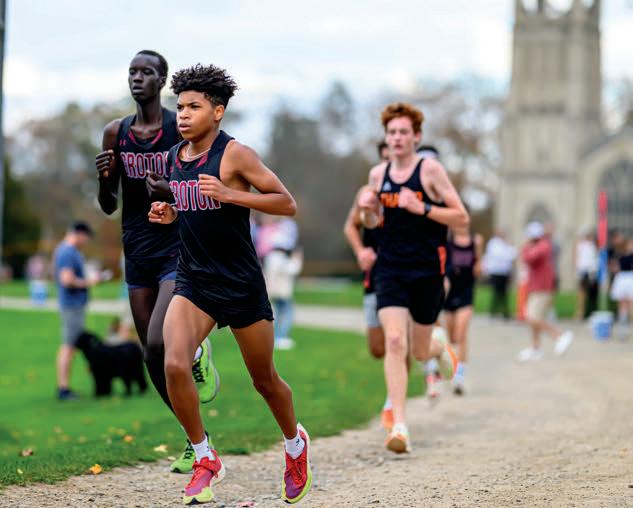
In its strongest season yet, Groton Varsity Volleyball finished 6–1 in our class. And despite losing star hitting power in the season due to injuries, we still reached our season goal of receiving an invitation to league playoffs for the first time in program history. In playoff competition, we faced the eight-time class champions in the first tournament round, but still nearly eked out a second set win. In their first season as a coaching duo, Head Coach Jen Kane and Assistant Coach Celene Ibrahim were delighted with the grit, dedication, and joy that the team brought to the court. On many afternoons, when the official practice time had transpired, the coaches were met
with hopeful requests for “just one more ball!” Though the team will miss the integral contributions of our senior captains, with a plethora of Zebra talent remaining on the court, we look forward to a robust volleyball program well into the future.
Coach Jennifer Kane
The Groton girls varsity field hockey team returned to campus prepared to build on the success from last year. After a sweltering preseason, the team traveled to Pomfret for a series of scrimmages. Unfortunately, the team Groton was first scheduled to play did not have enough players. Before the question could even be asked, many players
had volunteered to join the other team, giving up their first opportunity to play with their teammates for the season, and for some, the first time to play for Groton in their career. This selfless act set the tone for the 2023 season.
Led by coaches Kellie Walsh and Ali Hamlin and Sixth Former captains Ellie Smith and Keira Ley, this year’s team struck the delicate balance of simultaneously being each other’s biggest competitors and cheerleaders. The hard work and dedication paid off, resulting in an impressive record of 10–4–1 in the regular season. The Zebras earned the number-four overall seed in the NEPSAC Class B playoffs which meant hosting rival St. Mark’s for a home playoff game, three days after tying them to end
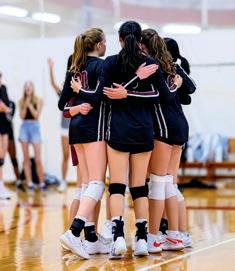
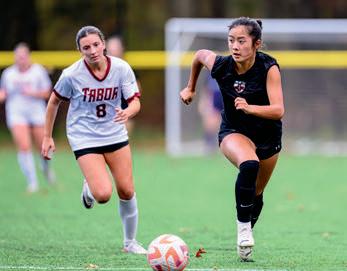


the regular season.
Despite the business of final exam week, the Groton community rallied to support the team. Although St. Mark’s tied the game twice, Groton came out victorious, earning a thrilling 3–2 win and advancing to the semi-finals. Unfortunately, Groton was shut out by the other Zebras Middlesex who went on to win the Class B championship, a few days later. While it was a bittersweet ending, the team made the entire Groton community proud. We are excited for next season and the continued growth of the program.
Coach Kellie Walsh
Coming off of a 2022 season that was defined by injury and illness, and looking to replace five runners who had filled varsity spots last fall, the girls cross country team came into the season looking to rebound and rebuild. Most of all the goal was to keep runners on their feet and stay healthy so that the girls could feel success, build on it, and maintain a sense of improvement and positive momentum both as individuals and as a group. The team did a great job realizing those goals. They earned a record of 6–6 in the ISL regular season, and after a ninth-place finish at the ISL championships, the girls rebounded on a challenging Roxbury Latin course to claim eighth out of sixteen scoring teams at the Division II championships.
Highlights of the season included a win over St. Mark's in our first regular-season meet, a win over Brooks and a tight, hardfought loss at St. George's, and a great team effort to earn a sweep of Rivers, Tabor, and Thayer at home on Parents Weekend. Fifth Formers Caroline Creasy, Gabriela Gil, and Lindy Zhang traded off as our top runner throughout the season and made a formidable front pack all fall. Penelope Tregoe ’25, Tori Reece ’25, Sydney Nelson ’26, Liv Ding ’26, Natalie Sun ’25, and captain Sheena Bakare ’24 all made important contributions to our varsity squad. With most of our varsity runners returning next fall, we look forward to building on the hard work and improvement the girls showed this season.
Coach Michael O’Donnell
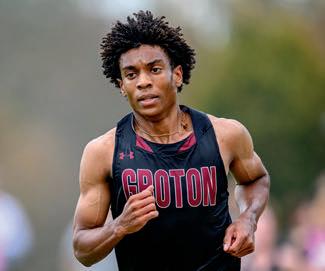

Boys cross-country runners launched our season by summiting both Monadnock and Wachusett mountains. This not only bolstered our team bonding, it was also the best way to beat the heat of the pre-season week on campus, by getting up above and beyond it. We set our sights on pushing ourselves over horizons and our spirits and the soles of our feet soared.
We scored a string of victories early in the season. Especially satisfying was our early win against St. Mark’s on their course. Cranking up an 11–5 record, a few of the bigger schools raced by us by the end of the season. St. Sebastian’s shot ahead in the ISL Championship, leaving us in sixth place

in the league. We finished sixth in the New England Championship as well, but our lead runner, Christopher Hovet ’25, finished this final race in first place.
Our racers lost lots of time this season, setting the bar lower and lower for our limber limbo dancers. Kudos especially to Sixth Formers Kogo Bennsion, team manager Jiwoo Han, Michael Lu, Aryan Mago, and to our three kings (i.e. captains) Ryder Cavanaugh, Jeremy Gall, and Eric Ge for leading us all to enlightenment.
Coach John Capen
The girls varsity soccer team welcomed seven newcomers to its roster this year. For this
reason, it was a season of many exciting firsts: first career goals, first career assists, first times playing new positions, and more. Our first win of the season took place on the Circle field with the chapel in the background against a strong St. Paul’s team, and ended in dramatic fashion. After an early breakaway goal from Grace Best ’26 and a quick answer from St. Paul’s, the game was tied until the 78th minute. After being substituted into the game to take the corner kick, Jess Shapiro ’26 picked out Tyler Martens ’27 in the box for a header goal to seal the game. This was the team’s first time beating St. Paul’s in many seasons.
We went on to win against a talented Middlesex team, avenging our loss to them last year. Despite a great battle against St.
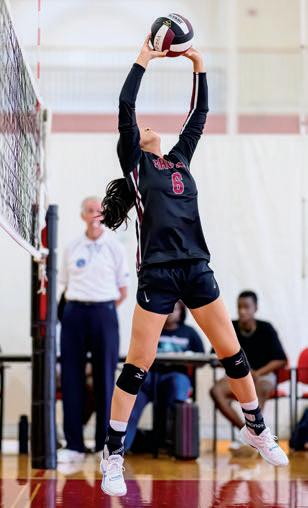
Mark’s and taking the lead early on, we lost our final game of the season 3–1.
We will only graduate three Sixth Formers this year, but their presences will be sorely missed. Morgan Fillion ’24 had another standout season in goal, Luisa Garciarramos Petricioli ’24 held down the midfield, and Julia Spada ’24 brought her continued technical and tactical knowledge to every minute she played. Beyond their contributions on the field, they have left behind a powerful legacy of caring for their teammates that will carry us in the years to come. We are excited for the future!
Coach Katie Kreider
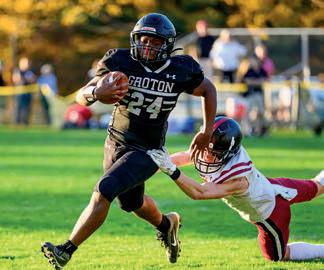


The soccer season started with thirty-two new and returning players coming to Groton for preseason in early September. After graduating fifteen Sixth Formers, the group was much younger, but everyone was excited and energized to be together. Throughout the week of preseason, the team worked hard and supported each other during training. At the end of the week, we hosted Proctor Academy for a scrimmage and then we turned our attention to the regular season and the start of the academic year. The team held formal tryouts to get to a final roster of twenty-four players. This year, the team was led by six Sixth Formers: Ben Milner, Leo Serodio, Duncan Wijnberg, Charlie Dubois, Fung Lam, and
Cam Cunningham. Captains for the season were Charlie Dubois ’24 and Will Klick ’25. The rest of the squad was made up of new and returning players, including Edward Wilkey ’25, James Ebert ’25, Arthur Murray ’26, Alex Foley ’26, Miles Zhang ’26, Jiayang Kang ’28, Eric Zhu ’27, Alex Holden ’27, Nick Holden ’27, William Cai ’26, Hayun Shin ’27, Ettore Monson ’27, William Garcia ’27, Juan Minda Chiriboga ’26, Sanya Ogundipe ’27, Nico Cirone ’28, and Roberto Palacios ’27.
The team finished with a record of 5–10–1. There were notable wins against Brooks and Tabor, both at home and under the lights. Groton also earned a hard-fought tie against St. Paul’s, scoring a goal in the last seconds to start the season on a positive



note. There were strong performances throughout the season, and with such a young team, we are optimistic about building on our successes from year to year.
Coach Joseph Martinez
The boys of fall came into the season with high expectations. We were returning a good number of seasoned players and felt that our younger players were ready to make a big jump in their development. When preseason began, it was evident that students came back to campus in shape. Though the weather was hot, the coaching staff and students adjusted and we all felt ready for the season after our scrimmage with St. Paul’s.
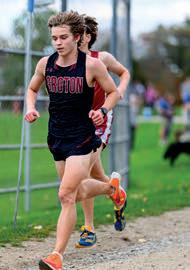

Our first game of the year with Brooks was a classic hard-nosed football game that was won and lost in the trenches. The work our students did in the off season was put on display and in a back and forth battle, the Zebras came out on top. We split the next two games against Rivers and Midldesex and, in both contests, spirits were high and the team felt good about what could be accomplished by the end of the season. Unfortunately, right at that point, the injury bug took a strong hold on our team and though we battled in every contest, we could not overcome the adversity. However, the team became full strength again for St. Mark’s and we showed off our full potential, beating our rivals 33–0.
By the end of the season, there were
many “What if?” questions, but overall, this group of young men performed valiantly and the coaching staff is looking forward to this upcoming fall.
Assistant Coach Harold Francis with Coach Jamie Lamoreaux

Most Valuable Player
Christopher Hovet ’25
Coaches’ Award
Ryder Cavanaugh ’24
Jeremy Gall ’24
Eric Ge ’24
Most Improved Runner
Damien West ’26
All-ISL
Christopher Hovet ’25
All-NEPSAC
Christopher Hovet ’25
Captains-Elect
Christopher Hovet ’25
Liam Warren ’25
Coaches’ Award
Sheena Bakare ’24
Most Improved
Natalie Sun ’25
ISL Honorable Mention
Caroline Creasy ’25
Gabriela Gil ’25
Lindy Zhang ’25
Captains-Elect
Gabriela Gil ’25
Margaret Kaneb ’25
Lindy Zhang ’25
Outstanding Performance
Ellie Smith ’24
Most Improved Player
Zoë Smith ’28
Coaches’ Award
Inga Bartsch ’24
All-ISL
Keira Ley ’24
Ellie Smith ’24
ISL Honorable Mention
Angelina Che ’26
Dani Shyjan ’25
All-NEPSAC
Keira Ley ’24
Ellie Smith ’24
NEPSAC Honorable Mention
Angelina Che ’26
Dani Shyjan ’25
NFHCA All-Region Team
Angelina Che ’26
Ellie Smith ’24
Captains-Elect
Mimi Burnett ’25
Angelina Che ’26
Dani Shyjan ’25
Coaches’ Award
Forrest Nelson ’24
David Porter Jr. ’24
Charles Alexander Award
Sean Greene ’24
Most Improved Player
William Koukopoulos ’24
All-ISL
Sean Greene ’24
Salim Hill ’25
Will Koukopoulos ’24
Forrest Nelson ’24
ISL Honorable Mention
Patrick Keegan ’24
Nate Johnson ’24
Zachary Webber ’24
Captains-Elect
JP Charpentier ’25
Salim Hill ’25
BOYS SOCCER
Most Valuable Player
Leo Serodio ’24
Most Improved Player
Edward Wilkey ’25
Coaches’ Award
Satoshi Klick ’25
All-ISL
Leo Serodio ’24
ISL Honorable Mention
Satoshi Klick ’25
Edward Wilkey ’25
All-NEPSAC
Leo Serodio ’24
NEPSSA Senior All-Stars
Ben Milner ’24
Leo Serodio ’24
NEPSSA Junior All-Stars
Satoshi Klick ’25
Edward Wilkey ’25
Captains-Elect
Satoshi Klick ’25
Edward Wilkey ’25
GIRLS SOCCER
Sixth Form Award
Morgan Fillion ’24
All-ISL
Morgan Fillion ’24
Tyler Martens ’27
NEPSAC Honorable Mention
Tyler Martens ’27
NEPSGSA Junior All-Star
Genevieve Nelson ’25
Captains-Elect
Kate Bartlett ’25
Clara Maturo ’25
Genevieve Nelson ’25
Alicia Ye ’25
Coaches’ Award
Daisy Adinkrah ’24
Tyra Montan ’24
Alicia Guo ’24
All-ISL
Alicia Guo ’24
ISL Honorable Mention
Sophia Leng ’26
All-NEPSAC
Alicia Guo ’24
Captains-Elect
Sophia Leng ’26
Anjanette Lin ’25
Caiyu Yang ’25

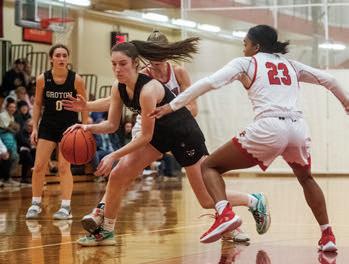

The girls varsity basketball team improved their record from 8–14 last season to 11–11 this season. Defense was the key to the improved season as they almost doubled their number of steals and blocks from the prior season, they took eleven offensive charges compared to only two last season and allowed six fewer points per game.
The season was marred by two players suffering season-ending injuries in December during the holiday tournament. The impact of these injuries and more injuries and illnesses throughout the season greatly impacted their team depth, but the girls persevered and ended up winning their last three games and six out of the last eight.


They missed making the postseason by percentage points, finishing ninth in New England Class B; only the top eight teams move on to the tournament.
They saved their most impressive win for last as they beat longtime rival St. Mark’s, 62–47, for the ninth year in a row. The win allowed this year’s Sixth Formers Grace Janusz, Morgan Fillion, and Kritika Aryal to join recent graduates as players who can proudly say they never lost to St. Mark’s in basketball! The St. Mark’s game marked the end of head coach Joe Crail’s final season at Groton after thirteen years at the school (ten seasons with the girls’ varsity); Crail’s final game happened to be his 100th win at Groton as well.
Coach Joe Crail
The 2023–24 basketball season was a season of perseverance for the team. We began the season with high aspirations and ended the 2023 calendar year by winning the Huckins-Rouse Tournament held every year at Middlesex. This was a big accomplishment for the team and our morale was very high. Though we were competitive in numerous games after that event, we unfortunately couldn’t accumulate the amount of wins that we had hoped for. The boys would be quick to tell you that wins and losses do not define our season. We grew as a program this winter in many ways, and I am excited to continue working with these young men next season.
Coach Harold Francis


The girls varsity squash team had a terrific season, culminating in an impressive 9–3 overall record and a commanding 7–1 performance in the ISL, securing a second place finish in the league. Their dominance was evident as they suffered only one homematch defeat, solidifying their strength on their home courts. The team’s depth shone through in decisive victories, often with scores like 7–0 or 5–2 against traditionally formidable opponents such as Nobles, Milton, and St. George’s. Additionally, they capped off a remarkable season with an eighth place finish in New England and an impressive eighteenth place nationally.
The season’s highlight came with their remarkable second-place finish at High
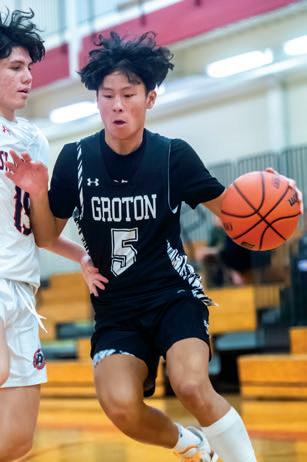
School Squash Nationals in Division II.
Overcoming fierce competition, they secured victories against Middlesex, Darien Girls, and Milton Academy en route to the finals, where they narrowly missed the championship title against Springside Chestnut Hill. Despite the loss, their performance marked one of the team’s highest finishes at Nationals in recent memory.
Looking ahead, the future appears promising for Groton Squash, with the top seven players set to return next season. This continuity bodes well for the team’s prospects, as they aim to build upon their successes and strive for even greater accomplishments in the future. As we bid farewell to outgoing captains Eleanor Taggart ’24 and Ava Bridges ’24, whose
leadership and contributions were invaluable, we extend our gratitude for their dedication to the team. Congratulations to the newly appointed captains, Natalie Sun ’25 and Caiyu Yang ’25. Special recognition is also due to Kayla Zheng ’26 and Sara Agrawal ’25, whose contributions provided the depth responsible for our overall success. As coaches, we take immense pride in the team’s achievements this season and eagerly anticipate their continued growth and success in the seasons to come.
Coach Nishad Das
Following a slew of graduations, this was a season of rebuilding the boys squash team.
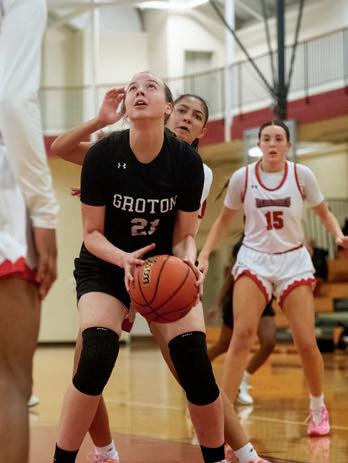
With our returners now playing in the top three spots and the rest of the ladder lacking varsity experience, we knew we would have plenty of work to do. This year’s players rose to the challenge, practicing with intensity, supporting each other on game days, and improving steadily through the season.
After a 3–4 loss to Exeter in December and a 4–3 win over St. George’s in early January, most of our regular-season matches were more lopsided. A mid-January result that really stung was played on a day when illness weakened our line-up, leading to a 2–5 loss to a much-improved St. Mark’s team. Hoping we might get a rematch in a late-season tournament, the players continued to practice well and make noticeable gains. By the time mid February came

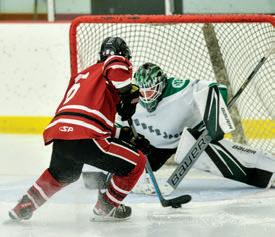
around, we were starting to look once again like a solid team from top to bottom. In late-season losses to deep teams from Milton and Nobles, the matches were close and competitive on all courts. We went to Berkshire over long weekend for the Division C New Englands and ended up in third place after a win over Dexter Southfield, a loss to Loomis Chaffee, and a win over KingswoodOxford. We then finished the season at the High School Nationals in Philadelphia, where a narrow loss in the first round and two decisive wins set up a long-awaited rematch with St. Mark’s in the final match of the season. That day could hardly have been scripted any better: Captain Evan Khym ’24 closed out the deciding fourth win on the way to the team’s 6–1 victory.
Having gained a great deal of valuable experience, raised their level of play, and thoroughly enjoyed this season, the players who will return to next year’s team are already setting their sights high.
Coach Dave Prockop
The girls varsity hockey team had another outstanding season. The team ended with an overall record of 18–6–2, tying last year’s mark with the most wins in program history. Their success continued into their ISL play, as they finished in second place with a record of 9–2–1. Their hard work and commitment to each other propelled them into a strong finish and once again earned them the


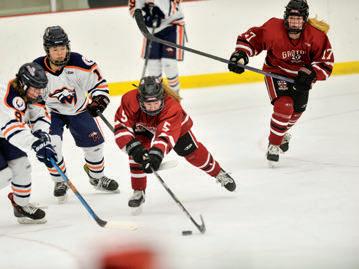
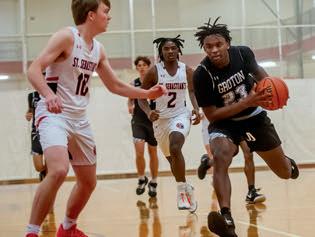

number-one seed in the NEPSAC Dorothy Howard Tournament (Small School) for the second year in a row. Although the girls came up a bit short and lost in the championship game, there’s so much to be proud of this amazing group of student-athletes.
The girls started out the season with high hopes and expectations. We made it a goal to be a strong and defensive-minded team each time they stepped out on the ice, and to defend home ice in the O’Brien Rink. They succeeded and ended with a goal differential of plus-55 and never lost a game for the entire season on home ice (9–0–1), a truly impressive feat. Much of this success happened because of our impressive leadership from our Sixth Formers Veronika Hadamovsky, Keira Ley, Lulu Jerrett, Colby
Gund, and Ellie Smith. Their dedication and support will truly be missed next season.
Coach Tim LeRoy
The boys hockey team had a wildly successful season, earning a playoff berth in the Division 1 small school NEPSAC tournament. In addition, the boys finished the regular season tied for second place in the ISL Eberhart Division. The team had great balance when it came to goaltending, defense, and offense, as well as great leadership from the nine Sixth Formers.
The season started off strong when the Zebras were the only team to win all three
games at the St. Paul’s Jamboree in late November. They outscored Tabor, Governor’s, and St. Paul’s by a 12–6 margin during the two-day jamboree in Concord, NH. The Zebras performed well throughout December, too, with wins over Roxbury Latin, Thayer Academy, and Proctor Academy. They earned an opportunity to play for a championship trophy during the forty-ninth annual Groton Lawrence Holiday Tournament, falling short to a talented Holderness team. During January, the most grueling part of the season, the Zebras thrived, going 7–2–1, including a 1–0 shutout win at Phillips Exeter, a 5–4 overtime win against Middlesex, and an exciting 3–2 victory at Rivers. The stretch in February started off with a bang when the Zebras took down the Lions of St. Mark’s


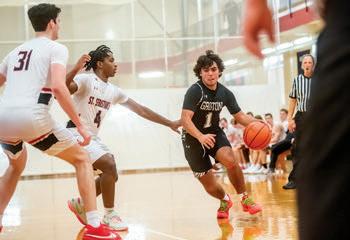

with a 4–2 win in front of a large O’Brien Rink crowd. Other February wins came against BB&N and Middlesex.
It is worth noting that much of our success was due to our veteran leadership group, who had specific areas that they wanted to focus on: being consistent, holding each other accountable, playing with grit, and having fun every time they came down to the rink. The team doubled their win total from the previous season and we were pleased with how they performed all winter long. The Groton boys hockey team will greatly miss the Sixth Formers who will be graduating this spring: C.J. Armaly, Ryder Cavenaugh, Allen Fang, Devin Fitzgerald, Gavin Cronin, Nate Johnson, Forrest Nelson, Will Koukopoulos, and Ethan
Ramonetti. All of these student-athletes left an indelible mark on the program. While we will miss these graduating Sixth Formers, we are also excited about the future of the program. We hope to see you in the rinks next winter.
Coach Bill Riley
The swim team had another competitive season with some significant dual meet performances in relays and individual swims. The team finished sixth overall at the EIL/ ISL championship. Some meet highlights included the boys 200 medley relay of Jean-Louis Andreani ’26, Jeffrey Wu ’28, Christopher Hovet ’25, and Callum Musto ’26
and the boys 200 freestyle relay (with the same swimmers) both finishing third.
The team this year worked to achieve some impressive dual meet wins against Andover JV and Exeter JV. With impressive work at practice and teamwork at meets, the 2024 swim season re-wrote the record board with multiple individual and relay records being broken.
Captains Eric Ge ’24, Georgia Martin ’24, Paopao Zhang ’24, Christopher Hovet ’25 led the coed squad all winter long. With many returning swimmers, the team is looking forward to a great season next winter!
Coach Katherine O’Shea

BOYS BASKETBALL
Most Valuable Player
Sean Greene ’24
Coaches’ Award
Griffin Gura ’24
Duncan Wijnberg ’24
ISL Honorable Mention
Sean Greene ’24
Most Valuable Player
Asante Kiio ’25
Tim Smith ’25
Daivyon Williams ’25
Captains-Elect
Asante Kiio ’25
Tim Smith ’25
Daivyon Williams ’25
GIRLS BASKETBALL
Most Valuable Player
Male Montero ’25
Grace Janusz ’24
Coaches’ Award
Morgan Fillion ’24
All-ISL
Camryn Dunn ’26
ISL Honorable Mention
Ava Dwyer ’26
Male Montero ’25
NEPSGBA Class B East All-Star
Camryn Dunn ’26
Captains-Elect
Ava Dwyer ’26
Male Montero ’25
Tori Reece ’25
BOYS ICE HOCKEY
Most Valuable Player
Ethan Ramonetti ’24
Coaches’ Award
CJ Armaly ’24
Seventh Player Award
Will Koukopoulos ’24
All-ISL
Zach Baker ’25
Kaiden Donia ’26
Allen Fang ’24
Alejandro Hassan ’26
Ethan Ramonetti ’24
Connor Wig ’26
ISL Honorable Mention
CJ Armaly ’24
Devin Fitzgerald ’24
Will Koukopoulos ’24
Elliot Wood ’26
All-NEPSAC Honorable Mention
Ethan Ramonetti ’24
Allen Fang ’24
Captains-Elect
Zach Baker ’25
JP Charpentier ’25
Cam Cirone ’25
Angus Frew ’25
Jason Mah ’25
Lucas Wu ’25
ICE HOCKEY
Most Valuable Players
Veronika Hadamovsky ’24
Keira Ley ’24
Most Improved Player
Oona Kathan ’26
All-ISL
Veronika Hadamovsky ’24
Keira Ley ’24
Christina Scalese ’26
ISL Honorable Mention
Maddie Cronan ’25
Jaelyn Trudell ’26
All-NEPSAC
Co-Player of the Year
Veronika Hadamovsky ‘24
All-NEPSAC
Veronika Hadamovsky ’24
Keira Ley ’24
Christina Scalese ’26
All-NEPSAC Honorable Mention
Maddie Cronan ’25
Captains-Elect
Maddie Cronan ’25
Dani Shyjan ’25
Alternate Captains-Elect
Kate Bartlett ’25
Christina Scalese ’26
Most Valuable Player
Evan Khym ’24
Most Improved Player
Samuel Lu ’27
All-ISL
Evan Khym ’24
ISL Honorable Mention
Kevin Cai ’26
Carter Lightburn ’25
All-New England
Evan Khym ’24
All-New England Honorable Mention
Kevin Cai ’26
Carter Lightburn ’25
Captains-Elect
Kevin Cai ’26
Carter Lightburn ’25
GIRLS SQUASH
Most Valuable Player
Charlotte Ghaeli ’26
Coaches’ Award
Caiyu Yang ’25
All-ISL
Charlotte Ghaeli ’26
ISL Honorable Mention
Chloe McAullife ’26
Natalie Sun ’25
All-New England
Charlotte Ghaeli ’26
Natalie Sun ’25
All-New England Honorable Mention
Chloe McAullife ’26
Sunny Sun ’27
All-ISL Honorable Mention
Sara Agrawal ’25
Kayla Zheng ’26
Captains-Elect
Natalie Sun ’25
Caiyu Yang ’25
Most Valuable Swimmers
Caroline Creasy ’25
Callum Musto ’26
Coaches’ Award
Christopher Hovet ’25
Carina Li ’27
Most Improved Swimmer
Jean-Louis Andreani ’26
Agathe Robert ’24
Captains-Elect
Caroline Creasy ’25
Christopher Hovet ’25 Follow Groton Athletics on Twitter:


Groton's fall theater production was an intimate performance of The Curious Incident of the Dog in the Night-Time, an adaptation of the 2003 mystery novel of the same name. Presented as a play within a play, it tells the story of a young autistic boy who investigates the murder of a neighbor's dog.


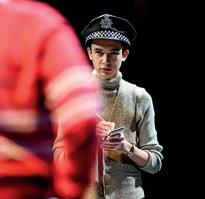





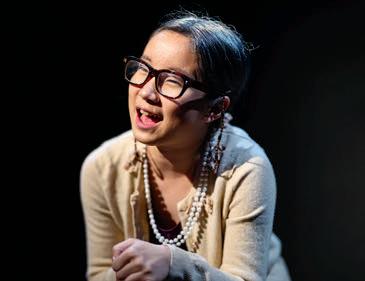
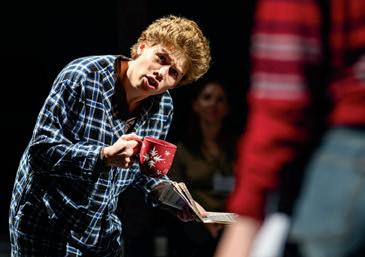

Groton’s winter theater production was the classic American musical “Chicago.”


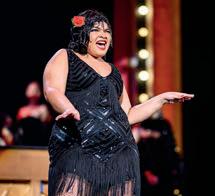



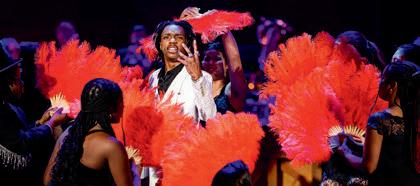

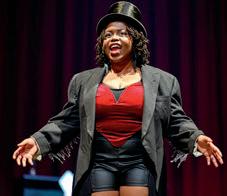
de Menil Gallery
FALL EXHIBIT
Lou Jones
October 2 – November 12, 2023


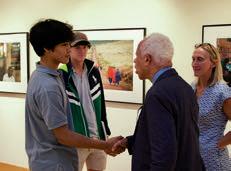

Groton School’s de Menil Gallery kicked off its 2023–24 season in September with Boston photographer Lou Jones’ panAFRICAproject. The mission of the exhibit was to create a contemporary visual portrait of modern Africa. De Menil Gallery Interim Director Blake Fitch hailed Mr. Jones as “way more than a documentary photographer,” pointing to his work in advertising, editorial, and fine art photography, and as an educator. The artist explained that, using photography and heretofore unavailable technologies, the intention of the exhibit was to establish a repository of images that represents each of the fifty-four individual countries devoid of the preconceived western notions of distress.
de Menil Gallery
SPRING EXHIBIT
Edel Rodriguez
January 14 – April 14, 2024

The de Menil Gallery welcomed acclaimed Cuban-American artist and author Edel Rodriguez to the Circle for “Undercurrents,” an exhibition of paintings, drawings, and published material examining the tides and undercurrents that have led to our present-day cultural and political moment. Inspired by personal history, religious rituals, politics, memory, and nostalgia, Mr.

Rodriguez’s bold, figurative works are an examination of identity, cultural displacement, and mortality.
At a reception kicking off the exhibit, Mr. Rodriguez also signed copies of his memoir, Worm, which tells a story of a boyhood in the midst of the Cold War, a family’s displacement in exile, and their tenacious longing for those they left behind.
The de Menil Gallery, in the Dillon Art Center at Groton School, is open
9 a.m. to 3 p.m. on weekdays (except Wednesdays) and 11 a.m. to 4 p.m. on weekends (except school holidays). The gallery is free and open to the public.
July 31, 1945 –February 16, 2024
by James Blaine ’63

In the summer of 1955, George’s older sister, Phyllis, invited my older sister, Robbin, to spend a couple of weeks at her grandparents’ house on Cape Cod. Like Plunkitt of Tammany Hall, my parents “seen their opportunity, and they took it”—and so a few weeks later a package deal of not just one Blaine, but two, was unloaded in the Whitneys’ driveway at Woods Hole, Massachusetts. It was the first time George and I had met; we’ve been close friends ever since.
For his first two decades, George was what was then called an underachiever. He was bright and good at things, with a big personality and an impish humor, but Groton initially found him unmotivated. His mother said he was lazy. Still, he accomplished much. At Groton he was captain of the crew, and his impersonation of Monsieur Moore in our Sixth Form variety show was so pitch perfect that it amused even our oft-caricatured French teacher. At Harvard, George stroked the
freshman crew and starred as Princess Atalanta in the Hasty Pudding show. In those days, though, Harvard was still fun, and academics were sometimes neglected.
When he crossed the Charles River to Harvard Business School, however, George was unfocused no more. After failing to get in on his first try, he became a Baker Scholar and, after graduating, he was the seventh person hired by Bain & Company, which now has 15,000 employees. He opened the company’s West Coast and Japan offices—although only after being admonished never again to visit a client in his shabby raincoat. He and his Bain partner John Halpern subsequently ran a successful private equity firm. But it was when he launched a cattle and wild rice business in northern California that his various lives fully came together. He loved the business, the land, and the people who worked it. The house he built at Goose Valley, a working ranch in an exotic location, became a special gathering place for his children, whom he adored. He was by now a quick study, a glutton for information, and an intense listener, and Denny Land and Cattle became the largest wild rice producer in the United States. It was here, too, that he cemented his affinity for wild places and for people who could teach him things he had not learned earlier in his life.
George not only did well, he did good—a cliché I’ve long mistrusted, but one that applies to George. He was enormously successful at his businesses, and he used those skills to try to leave behind a better world. He became a strong advocate for the environment, open space, and climate sanity, most notably as the longtime chair of Trust for Public Land (TPL). “We were all made better for having known him,” a fellow TPL board member remembered. He was for years a driven and driving force behind a number of scientific and political efforts to combat climate change, efforts that


ranged from funding an international research project to sponsoring a hard-hitting ad aimed at taking down then-Senator James Inhofe of Oklahoma. In 2011, Mitt Romney asked George to serve on his environmental advisory committee. Although George had hired Romney to start Bain Capital and considered him a friend, he declined the offer because he disagreed so strongly with Republican environmental policies.
He pursued all his interests with a passion, none more so than sailing. He competed regularly in the Bermuda Race on his beautiful wooden sloop, Restive, twice winning the celestial navigation trophy. He sailed more calmly in the waters of New England, the Caribbean, and the Canadian Maritimes, where he explored ever more remote parts of the Newfoundland coast. He often invited friends to join him, and, typical of his generosity, all they had to do was show up; George took care of everything else.
His adventures were not always without mishap. On his return from Bermuda in 2016, a failed rudder forced him (along with David Lawrence ’63, me, and our college friend, Fred Dabney) to abandon ship in the North Atlantic, although it nearly broke George’s heart to leave that boat. We were rescued from our mercifully inflated yellow life raft by the crew of Sparky, whom we had met by chance in Bermuda and who turned back after picking up our SOS two hours away. Our rescuers were stunned to see seventy-year-old men jump overboard in a raging sea; they were even more stunned when they learned how
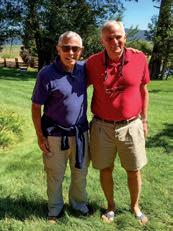
many years our friendships had endured. The two crews became fast friends, and Sparky’s skipper, Rob McAlpine, now owns and sails the salvaged Restive each summer in Maine’s waters.*
George battled a number of serious ailments for several years, including two kinds of cancer and a series of lung issues. He recovered again and again, only to be struck from another angle. And while he kept coming back—he took family and friends on a memorable Alaska cruise less than a year ago—the inelasticity of his lungs finally got him. Friends from across the diverse parts of his life turned out to celebrate him last February in Harvard’s Memorial Church.
His first wife, Tizzie Kinnicutt, who was his Dance Weekend date and from whom he was divorced, died in 2004. With his second wife, Joan Fitzgerald, he has three children, Frances, a photographer, George, a novelist, and Amos, who now runs Goose Valley ranch. He is also survived by his wife Leigh, Frances’ daughter, Virginia, and Leigh’s son, Hunter. Sadly, George’s brother, Breck ’66, he of the warm and unforgettable laugh, died unexpectedly last November.
You may have noticed that I have used the present tense for George. His death cannot erase seven decades of friendship. He is an extraordinary friend. He lived an extraordinary life.
You can read more about the “rescue at sea” at https://jamesgblaine.com/rescue-at-sea-a-series
Form Notes are password-protected. Members of the Groton community may read them online by signing into GrotonConnect at www.grotonalumni.network.
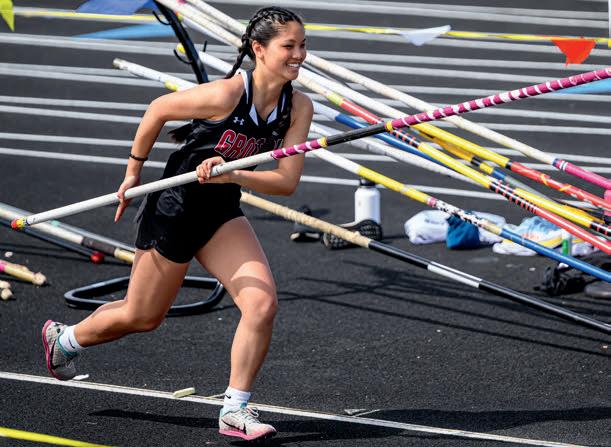
You can support Groton by naming the school as a beneficiary of your:
• Retirement plans, such as an IRA, 401(k) or 403(b),
• Bank and brokerage accounts, or
• Paid-up life insurance policy.
Beneficiary designations let you specify the individuals and charities you want to support and the percentage of assets you want each beneficiary to receive, all while providing income and estate tax benefits. You can control the disposition of these assets without changing your will or living trust. It’s as easy as filling out a form, available through your plan administrator.
To learn more about life insurance or retirement plan gifts, or planned giving generally, please visit: Legacy.groton.org

The Circle Society recognizes those who have provided for Groton School’s future through their estate plans. Groton is grateful to each Circle Society member for their thoughtful planning, which ensures future support for Groton’s mission to foster a diverse and intimate community devoted to inspiring lives of character, scholarship, leadership, and service.
Questions? Please contact Giulia King in the Office of Development and Alumni Affairs, at 978-448-7597 or gking@groton.org.
Groton School
P.O. Box 991
Groton, Massachusetts 01450-0991
Change Service Requested
U.S. Postage PAID North Reading, MA Permit 215


THESE THREE cuneiform tablets were gifted to Groton School in 1932 by the Morgan Library at the behest of founding Groton trustee, J.P. Morgan, by his grandson, Henry S. Morgan 1919, P’42, ’44, ’46, ’49, ’56, GP’67, FTR ’31–’61, then president of the Morgan Library.
These artifacts are well-preserved examples of some of the earliest known writing systems in the world. Scholars in the Ancient Near Eastern Studies department at Harvard University recently deciphered the ancient inscriptions on these tablets and established their provenience, dating from

c. 2050, 2025, and 510 BCE A publication of their findings is forthcoming.
When they are not being used by students and teachers in global history and classics courses, the tablets reside in Groton School’s archives and special collections.
To learn more about these ancient artifacts, their origins, uses and read translations of the inscriptions, go to the Cuneiform Digital Library Initiative site online, where they are collected along with others from across the globe.